Revisiting the Concept of Social Entrepreneurship
VerifiedAdded on 2019/12/18
|20
|7152
|432
Essay
AI Summary
This assignment content is a collection of various research articles and books related to social entrepreneurship, entrepreneurship education, business models, and innovation. The articles cover topics such as the importance of contextualizing entrepreneurship, the role of knowledge management in small and medium-sized enterprises (SMEs), and the impact of entrepreneurial marketing on small businesses. Additionally, there are discussions on the formation of human capital in entrepreneurship, the need for a comprehensive theory of entrepreneurship, and the challenges faced by entrepreneurs in different countries. Overall, this collection provides insights into the various aspects of entrepreneurship and social entrepreneurship.
Contribute Materials
Your contribution can guide someone’s learning journey. Share your
documents today.

Entrepreneurship
Secure Best Marks with AI Grader
Need help grading? Try our AI Grader for instant feedback on your assignments.
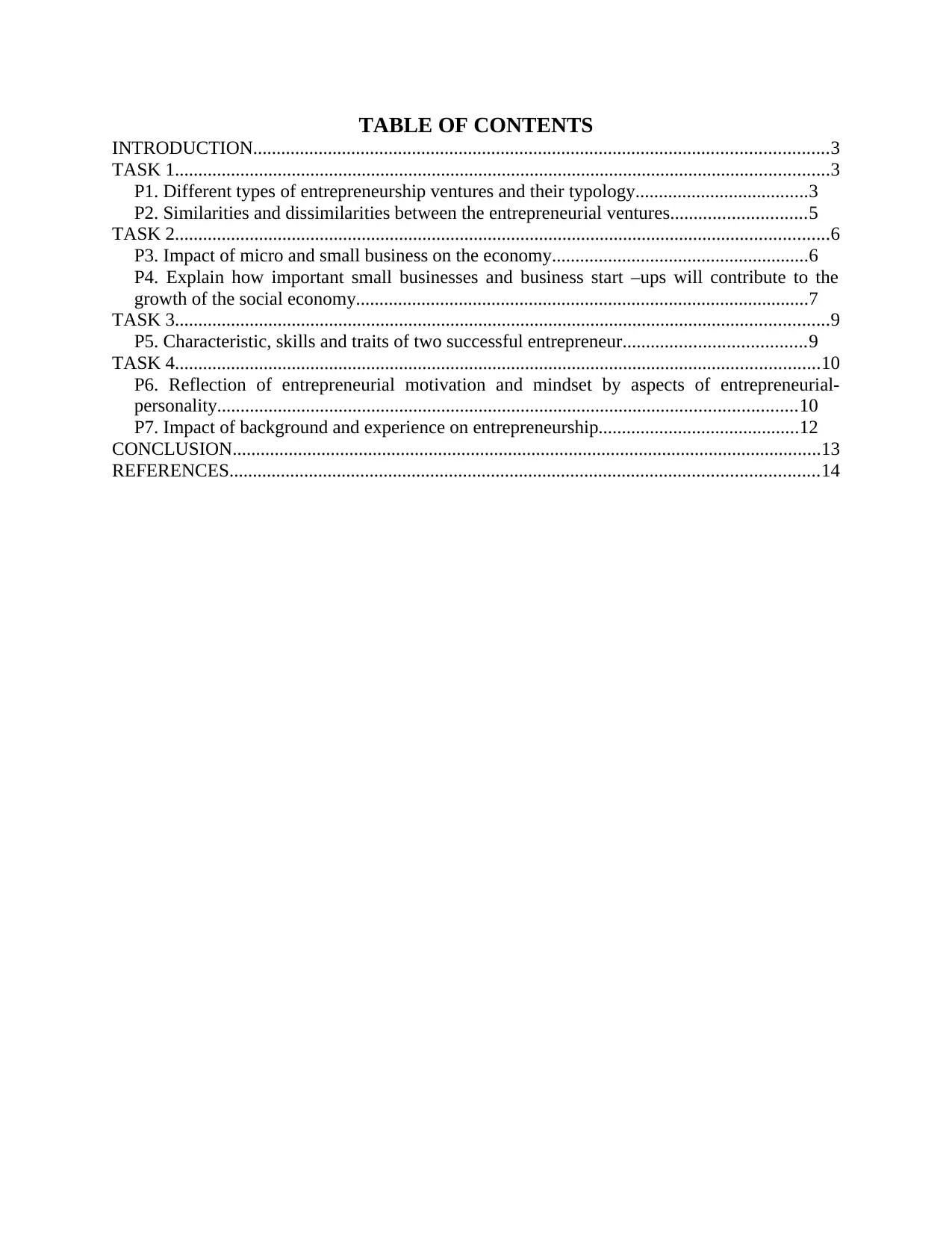
TABLE OF CONTENTS
INTRODUCTION...........................................................................................................................3
TASK 1............................................................................................................................................3
P1. Different types of entrepreneurship ventures and their typology.....................................3
P2. Similarities and dissimilarities between the entrepreneurial ventures.............................5
TASK 2............................................................................................................................................6
P3. Impact of micro and small business on the economy.......................................................6
P4. Explain how important small businesses and business start –ups will contribute to the
growth of the social economy.................................................................................................7
TASK 3............................................................................................................................................9
P5. Characteristic, skills and traits of two successful entrepreneur.......................................9
TASK 4..........................................................................................................................................10
P6. Reflection of entrepreneurial motivation and mindset by aspects of entrepreneurial-
personality............................................................................................................................10
P7. Impact of background and experience on entrepreneurship...........................................12
CONCLUSION..............................................................................................................................13
REFERENCES..............................................................................................................................14
INTRODUCTION...........................................................................................................................3
TASK 1............................................................................................................................................3
P1. Different types of entrepreneurship ventures and their typology.....................................3
P2. Similarities and dissimilarities between the entrepreneurial ventures.............................5
TASK 2............................................................................................................................................6
P3. Impact of micro and small business on the economy.......................................................6
P4. Explain how important small businesses and business start –ups will contribute to the
growth of the social economy.................................................................................................7
TASK 3............................................................................................................................................9
P5. Characteristic, skills and traits of two successful entrepreneur.......................................9
TASK 4..........................................................................................................................................10
P6. Reflection of entrepreneurial motivation and mindset by aspects of entrepreneurial-
personality............................................................................................................................10
P7. Impact of background and experience on entrepreneurship...........................................12
CONCLUSION..............................................................................................................................13
REFERENCES..............................................................................................................................14
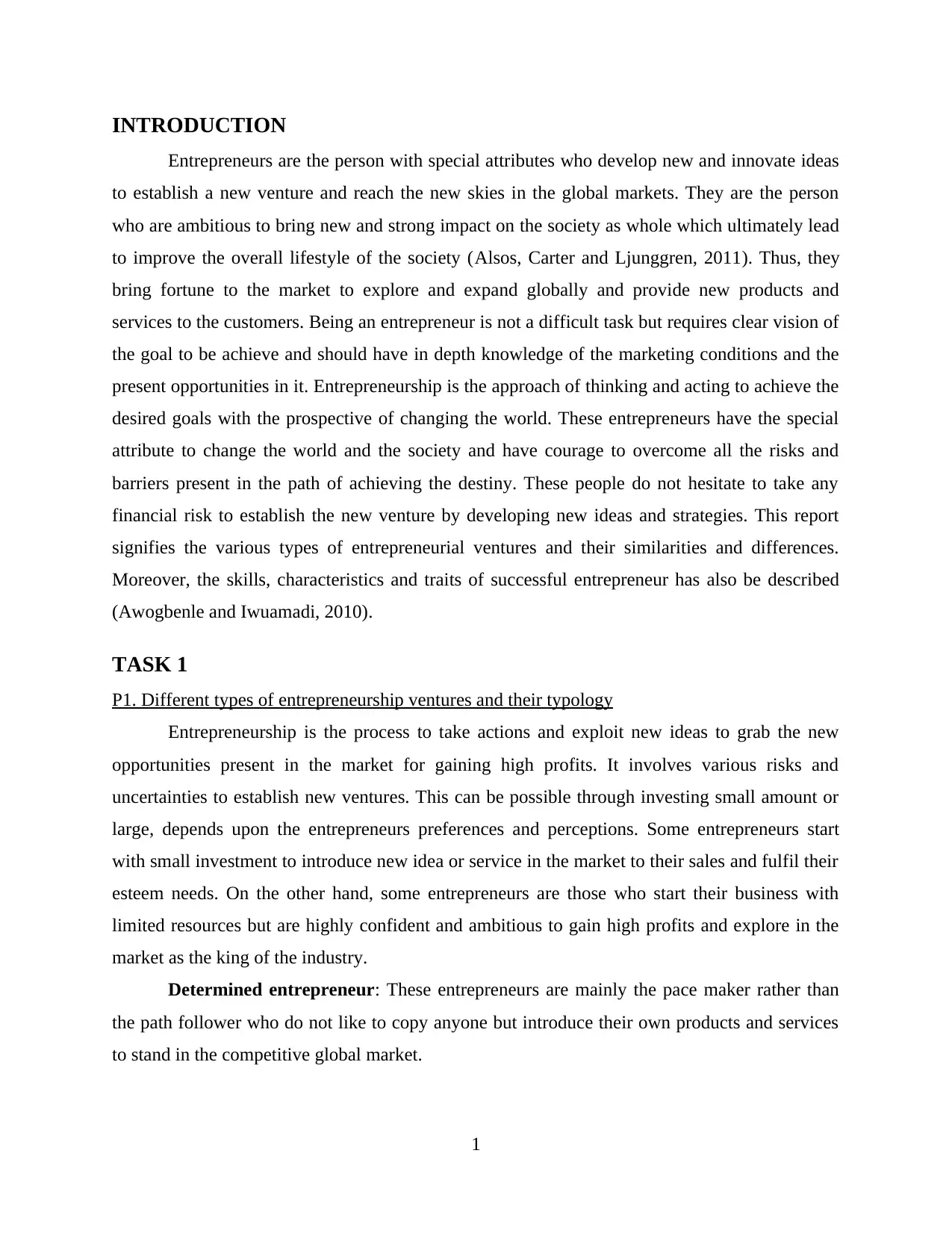
INTRODUCTION
Entrepreneurs are the person with special attributes who develop new and innovate ideas
to establish a new venture and reach the new skies in the global markets. They are the person
who are ambitious to bring new and strong impact on the society as whole which ultimately lead
to improve the overall lifestyle of the society (Alsos, Carter and Ljunggren, 2011). Thus, they
bring fortune to the market to explore and expand globally and provide new products and
services to the customers. Being an entrepreneur is not a difficult task but requires clear vision of
the goal to be achieve and should have in depth knowledge of the marketing conditions and the
present opportunities in it. Entrepreneurship is the approach of thinking and acting to achieve the
desired goals with the prospective of changing the world. These entrepreneurs have the special
attribute to change the world and the society and have courage to overcome all the risks and
barriers present in the path of achieving the destiny. These people do not hesitate to take any
financial risk to establish the new venture by developing new ideas and strategies. This report
signifies the various types of entrepreneurial ventures and their similarities and differences.
Moreover, the skills, characteristics and traits of successful entrepreneur has also be described
(Awogbenle and Iwuamadi, 2010).
TASK 1
P1. Different types of entrepreneurship ventures and their typology
Entrepreneurship is the process to take actions and exploit new ideas to grab the new
opportunities present in the market for gaining high profits. It involves various risks and
uncertainties to establish new ventures. This can be possible through investing small amount or
large, depends upon the entrepreneurs preferences and perceptions. Some entrepreneurs start
with small investment to introduce new idea or service in the market to their sales and fulfil their
esteem needs. On the other hand, some entrepreneurs are those who start their business with
limited resources but are highly confident and ambitious to gain high profits and explore in the
market as the king of the industry.
Determined entrepreneur: These entrepreneurs are mainly the pace maker rather than
the path follower who do not like to copy anyone but introduce their own products and services
to stand in the competitive global market.
1
Entrepreneurs are the person with special attributes who develop new and innovate ideas
to establish a new venture and reach the new skies in the global markets. They are the person
who are ambitious to bring new and strong impact on the society as whole which ultimately lead
to improve the overall lifestyle of the society (Alsos, Carter and Ljunggren, 2011). Thus, they
bring fortune to the market to explore and expand globally and provide new products and
services to the customers. Being an entrepreneur is not a difficult task but requires clear vision of
the goal to be achieve and should have in depth knowledge of the marketing conditions and the
present opportunities in it. Entrepreneurship is the approach of thinking and acting to achieve the
desired goals with the prospective of changing the world. These entrepreneurs have the special
attribute to change the world and the society and have courage to overcome all the risks and
barriers present in the path of achieving the destiny. These people do not hesitate to take any
financial risk to establish the new venture by developing new ideas and strategies. This report
signifies the various types of entrepreneurial ventures and their similarities and differences.
Moreover, the skills, characteristics and traits of successful entrepreneur has also be described
(Awogbenle and Iwuamadi, 2010).
TASK 1
P1. Different types of entrepreneurship ventures and their typology
Entrepreneurship is the process to take actions and exploit new ideas to grab the new
opportunities present in the market for gaining high profits. It involves various risks and
uncertainties to establish new ventures. This can be possible through investing small amount or
large, depends upon the entrepreneurs preferences and perceptions. Some entrepreneurs start
with small investment to introduce new idea or service in the market to their sales and fulfil their
esteem needs. On the other hand, some entrepreneurs are those who start their business with
limited resources but are highly confident and ambitious to gain high profits and explore in the
market as the king of the industry.
Determined entrepreneur: These entrepreneurs are mainly the pace maker rather than
the path follower who do not like to copy anyone but introduce their own products and services
to stand in the competitive global market.
1
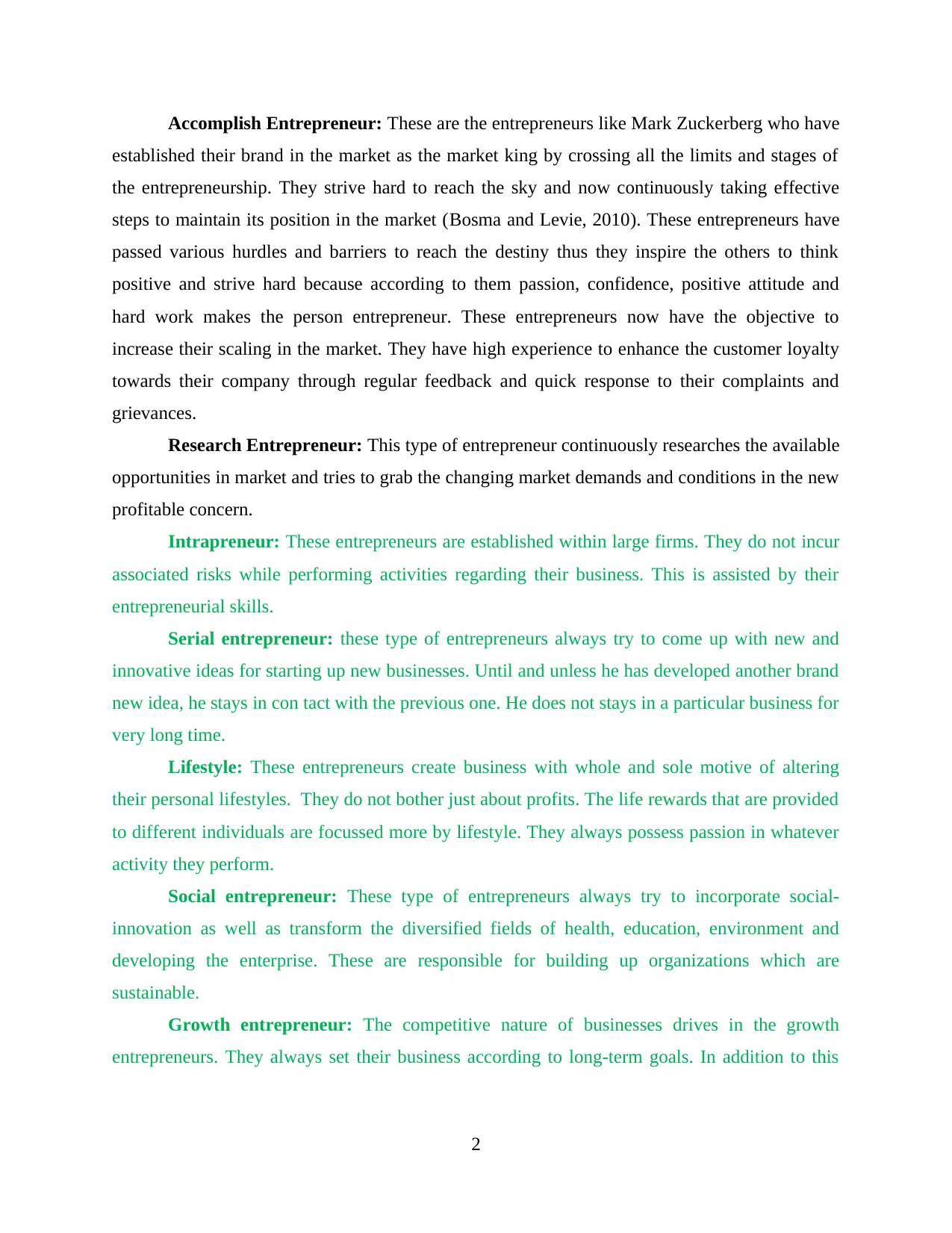
Accomplish Entrepreneur: These are the entrepreneurs like Mark Zuckerberg who have
established their brand in the market as the market king by crossing all the limits and stages of
the entrepreneurship. They strive hard to reach the sky and now continuously taking effective
steps to maintain its position in the market (Bosma and Levie, 2010). These entrepreneurs have
passed various hurdles and barriers to reach the destiny thus they inspire the others to think
positive and strive hard because according to them passion, confidence, positive attitude and
hard work makes the person entrepreneur. These entrepreneurs now have the objective to
increase their scaling in the market. They have high experience to enhance the customer loyalty
towards their company through regular feedback and quick response to their complaints and
grievances.
Research Entrepreneur: This type of entrepreneur continuously researches the available
opportunities in market and tries to grab the changing market demands and conditions in the new
profitable concern.
Intrapreneur: These entrepreneurs are established within large firms. They do not incur
associated risks while performing activities regarding their business. This is assisted by their
entrepreneurial skills.
Serial entrepreneur: these type of entrepreneurs always try to come up with new and
innovative ideas for starting up new businesses. Until and unless he has developed another brand
new idea, he stays in con tact with the previous one. He does not stays in a particular business for
very long time.
Lifestyle: These entrepreneurs create business with whole and sole motive of altering
their personal lifestyles. They do not bother just about profits. The life rewards that are provided
to different individuals are focussed more by lifestyle. They always possess passion in whatever
activity they perform.
Social entrepreneur: These type of entrepreneurs always try to incorporate social-
innovation as well as transform the diversified fields of health, education, environment and
developing the enterprise. These are responsible for building up organizations which are
sustainable.
Growth entrepreneur: The competitive nature of businesses drives in the growth
entrepreneurs. They always set their business according to long-term goals. In addition to this
2
established their brand in the market as the market king by crossing all the limits and stages of
the entrepreneurship. They strive hard to reach the sky and now continuously taking effective
steps to maintain its position in the market (Bosma and Levie, 2010). These entrepreneurs have
passed various hurdles and barriers to reach the destiny thus they inspire the others to think
positive and strive hard because according to them passion, confidence, positive attitude and
hard work makes the person entrepreneur. These entrepreneurs now have the objective to
increase their scaling in the market. They have high experience to enhance the customer loyalty
towards their company through regular feedback and quick response to their complaints and
grievances.
Research Entrepreneur: This type of entrepreneur continuously researches the available
opportunities in market and tries to grab the changing market demands and conditions in the new
profitable concern.
Intrapreneur: These entrepreneurs are established within large firms. They do not incur
associated risks while performing activities regarding their business. This is assisted by their
entrepreneurial skills.
Serial entrepreneur: these type of entrepreneurs always try to come up with new and
innovative ideas for starting up new businesses. Until and unless he has developed another brand
new idea, he stays in con tact with the previous one. He does not stays in a particular business for
very long time.
Lifestyle: These entrepreneurs create business with whole and sole motive of altering
their personal lifestyles. They do not bother just about profits. The life rewards that are provided
to different individuals are focussed more by lifestyle. They always possess passion in whatever
activity they perform.
Social entrepreneur: These type of entrepreneurs always try to incorporate social-
innovation as well as transform the diversified fields of health, education, environment and
developing the enterprise. These are responsible for building up organizations which are
sustainable.
Growth entrepreneur: The competitive nature of businesses drives in the growth
entrepreneurs. They always set their business according to long-term goals. In addition to this
2
Secure Best Marks with AI Grader
Need help grading? Try our AI Grader for instant feedback on your assignments.
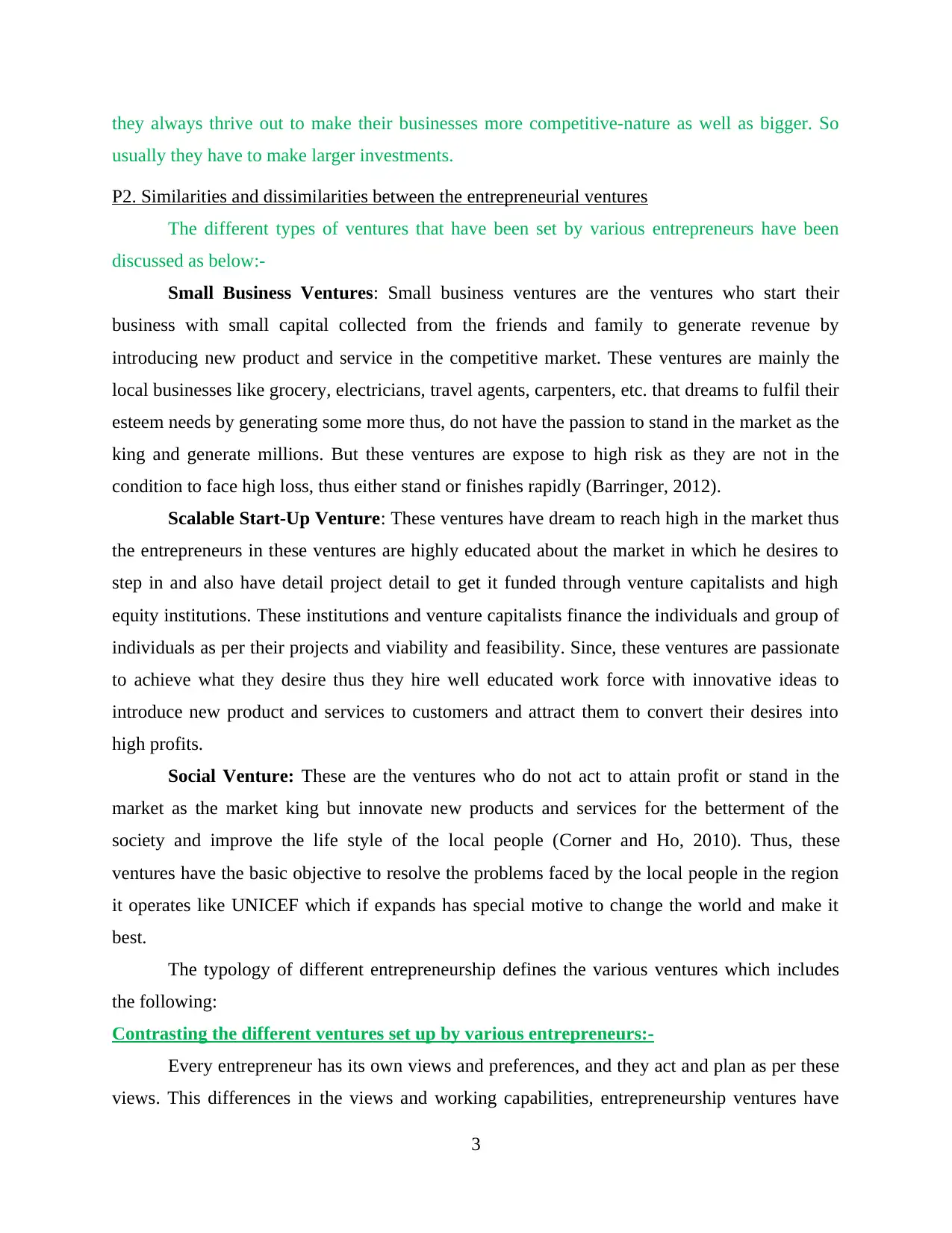
they always thrive out to make their businesses more competitive-nature as well as bigger. So
usually they have to make larger investments.
P2. Similarities and dissimilarities between the entrepreneurial ventures
The different types of ventures that have been set by various entrepreneurs have been
discussed as below:-
Small Business Ventures: Small business ventures are the ventures who start their
business with small capital collected from the friends and family to generate revenue by
introducing new product and service in the competitive market. These ventures are mainly the
local businesses like grocery, electricians, travel agents, carpenters, etc. that dreams to fulfil their
esteem needs by generating some more thus, do not have the passion to stand in the market as the
king and generate millions. But these ventures are expose to high risk as they are not in the
condition to face high loss, thus either stand or finishes rapidly (Barringer, 2012).
Scalable Start-Up Venture: These ventures have dream to reach high in the market thus
the entrepreneurs in these ventures are highly educated about the market in which he desires to
step in and also have detail project detail to get it funded through venture capitalists and high
equity institutions. These institutions and venture capitalists finance the individuals and group of
individuals as per their projects and viability and feasibility. Since, these ventures are passionate
to achieve what they desire thus they hire well educated work force with innovative ideas to
introduce new product and services to customers and attract them to convert their desires into
high profits.
Social Venture: These are the ventures who do not act to attain profit or stand in the
market as the market king but innovate new products and services for the betterment of the
society and improve the life style of the local people (Corner and Ho, 2010). Thus, these
ventures have the basic objective to resolve the problems faced by the local people in the region
it operates like UNICEF which if expands has special motive to change the world and make it
best.
The typology of different entrepreneurship defines the various ventures which includes
the following:
Contrasting the different ventures set up by various entrepreneurs:-
Every entrepreneur has its own views and preferences, and they act and plan as per these
views. This differences in the views and working capabilities, entrepreneurship ventures have
3
usually they have to make larger investments.
P2. Similarities and dissimilarities between the entrepreneurial ventures
The different types of ventures that have been set by various entrepreneurs have been
discussed as below:-
Small Business Ventures: Small business ventures are the ventures who start their
business with small capital collected from the friends and family to generate revenue by
introducing new product and service in the competitive market. These ventures are mainly the
local businesses like grocery, electricians, travel agents, carpenters, etc. that dreams to fulfil their
esteem needs by generating some more thus, do not have the passion to stand in the market as the
king and generate millions. But these ventures are expose to high risk as they are not in the
condition to face high loss, thus either stand or finishes rapidly (Barringer, 2012).
Scalable Start-Up Venture: These ventures have dream to reach high in the market thus
the entrepreneurs in these ventures are highly educated about the market in which he desires to
step in and also have detail project detail to get it funded through venture capitalists and high
equity institutions. These institutions and venture capitalists finance the individuals and group of
individuals as per their projects and viability and feasibility. Since, these ventures are passionate
to achieve what they desire thus they hire well educated work force with innovative ideas to
introduce new product and services to customers and attract them to convert their desires into
high profits.
Social Venture: These are the ventures who do not act to attain profit or stand in the
market as the market king but innovate new products and services for the betterment of the
society and improve the life style of the local people (Corner and Ho, 2010). Thus, these
ventures have the basic objective to resolve the problems faced by the local people in the region
it operates like UNICEF which if expands has special motive to change the world and make it
best.
The typology of different entrepreneurship defines the various ventures which includes
the following:
Contrasting the different ventures set up by various entrepreneurs:-
Every entrepreneur has its own views and preferences, and they act and plan as per these
views. This differences in the views and working capabilities, entrepreneurship ventures have
3
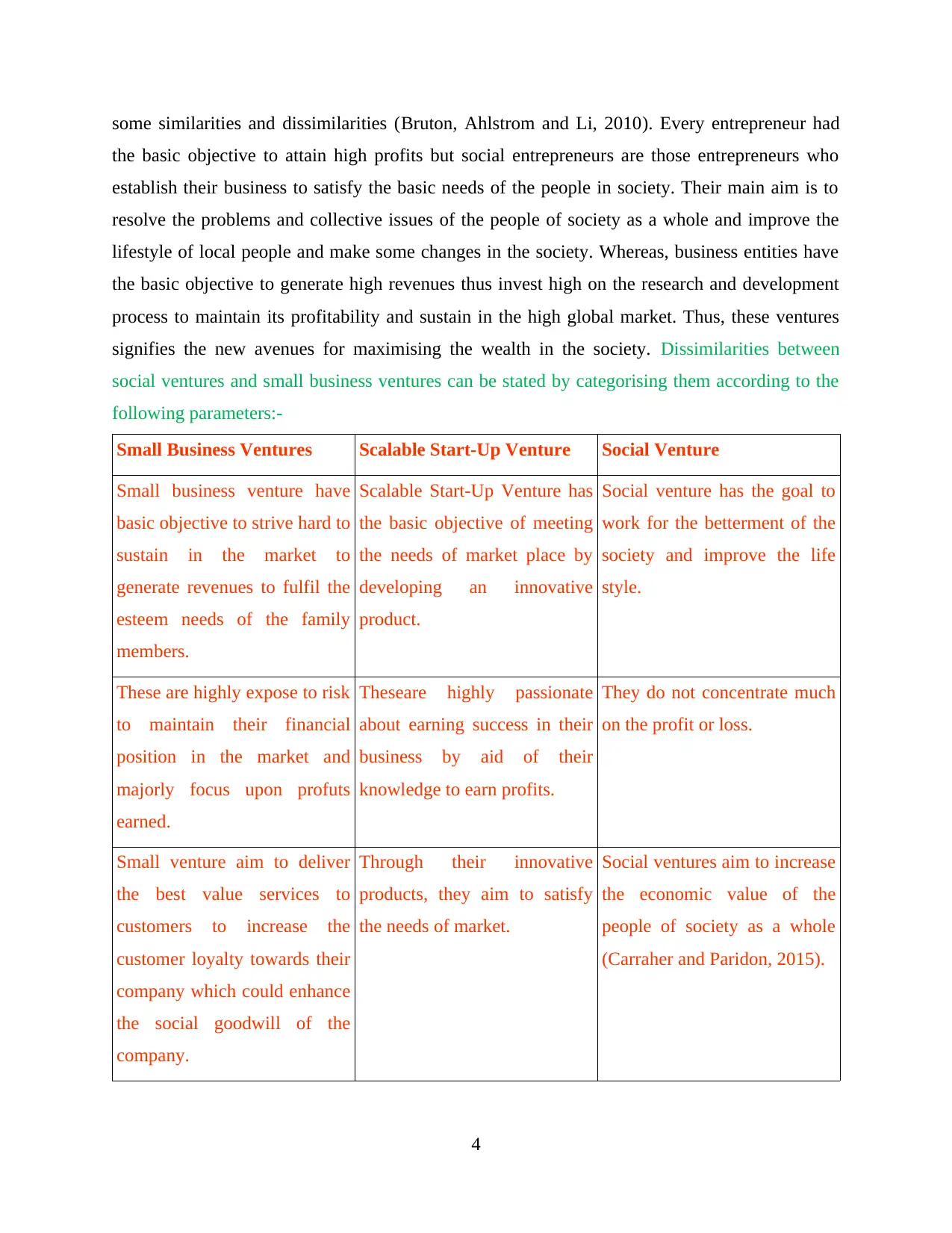
some similarities and dissimilarities (Bruton, Ahlstrom and Li, 2010). Every entrepreneur had
the basic objective to attain high profits but social entrepreneurs are those entrepreneurs who
establish their business to satisfy the basic needs of the people in society. Their main aim is to
resolve the problems and collective issues of the people of society as a whole and improve the
lifestyle of local people and make some changes in the society. Whereas, business entities have
the basic objective to generate high revenues thus invest high on the research and development
process to maintain its profitability and sustain in the high global market. Thus, these ventures
signifies the new avenues for maximising the wealth in the society. Dissimilarities between
social ventures and small business ventures can be stated by categorising them according to the
following parameters:-
Small Business Ventures Scalable Start-Up Venture Social Venture
Small business venture have
basic objective to strive hard to
sustain in the market to
generate revenues to fulfil the
esteem needs of the family
members.
Scalable Start-Up Venture has
the basic objective of meeting
the needs of market place by
developing an innovative
product.
Social venture has the goal to
work for the betterment of the
society and improve the life
style.
These are highly expose to risk
to maintain their financial
position in the market and
majorly focus upon profuts
earned.
Theseare highly passionate
about earning success in their
business by aid of their
knowledge to earn profits.
They do not concentrate much
on the profit or loss.
Small venture aim to deliver
the best value services to
customers to increase the
customer loyalty towards their
company which could enhance
the social goodwill of the
company.
Through their innovative
products, they aim to satisfy
the needs of market.
Social ventures aim to increase
the economic value of the
people of society as a whole
(Carraher and Paridon, 2015).
4
the basic objective to attain high profits but social entrepreneurs are those entrepreneurs who
establish their business to satisfy the basic needs of the people in society. Their main aim is to
resolve the problems and collective issues of the people of society as a whole and improve the
lifestyle of local people and make some changes in the society. Whereas, business entities have
the basic objective to generate high revenues thus invest high on the research and development
process to maintain its profitability and sustain in the high global market. Thus, these ventures
signifies the new avenues for maximising the wealth in the society. Dissimilarities between
social ventures and small business ventures can be stated by categorising them according to the
following parameters:-
Small Business Ventures Scalable Start-Up Venture Social Venture
Small business venture have
basic objective to strive hard to
sustain in the market to
generate revenues to fulfil the
esteem needs of the family
members.
Scalable Start-Up Venture has
the basic objective of meeting
the needs of market place by
developing an innovative
product.
Social venture has the goal to
work for the betterment of the
society and improve the life
style.
These are highly expose to risk
to maintain their financial
position in the market and
majorly focus upon profuts
earned.
Theseare highly passionate
about earning success in their
business by aid of their
knowledge to earn profits.
They do not concentrate much
on the profit or loss.
Small venture aim to deliver
the best value services to
customers to increase the
customer loyalty towards their
company which could enhance
the social goodwill of the
company.
Through their innovative
products, they aim to satisfy
the needs of market.
Social ventures aim to increase
the economic value of the
people of society as a whole
(Carraher and Paridon, 2015).
4
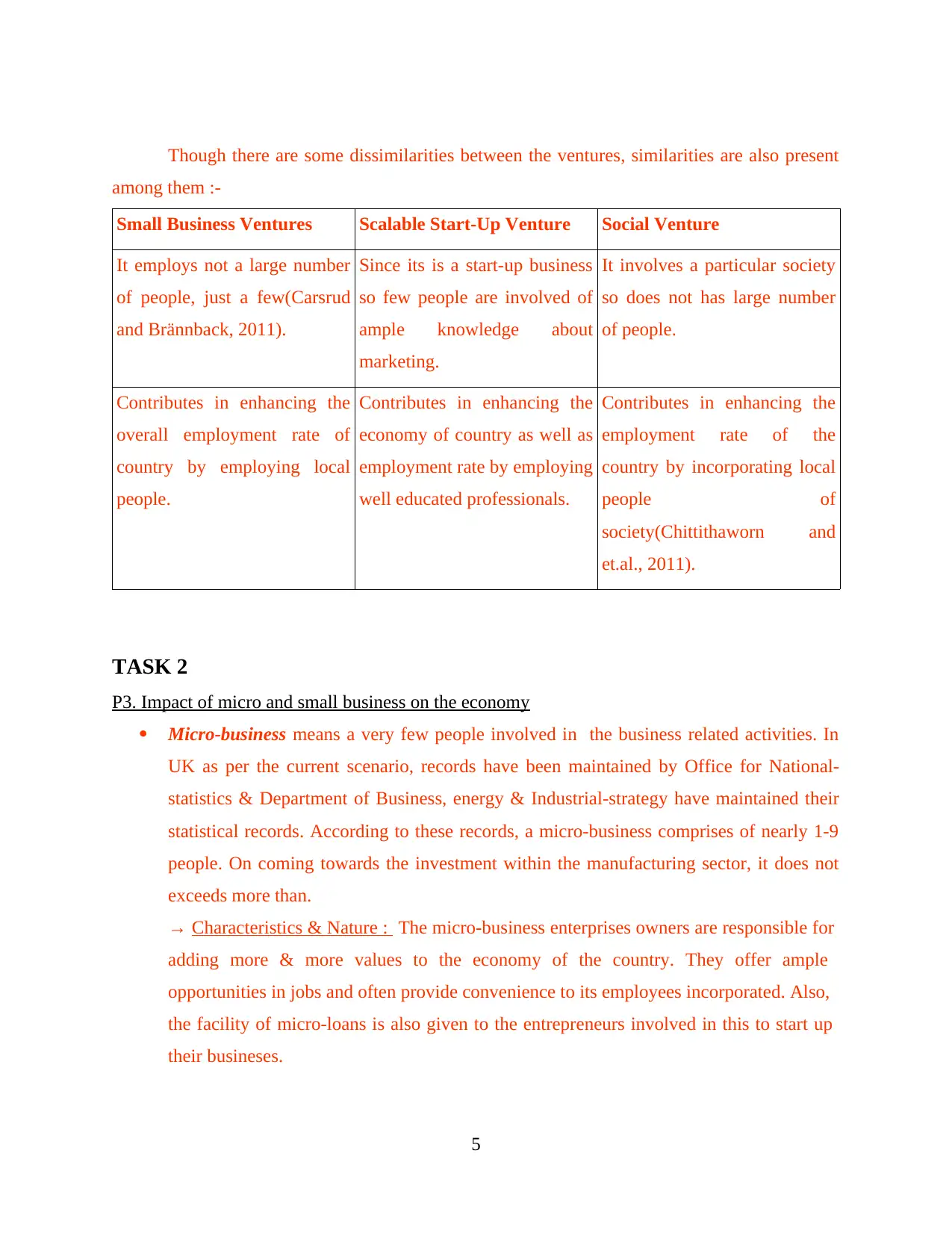
Though there are some dissimilarities between the ventures, similarities are also present
among them :-
Small Business Ventures Scalable Start-Up Venture Social Venture
It employs not a large number
of people, just a few(Carsrud
and Brännback, 2011).
Since its is a start-up business
so few people are involved of
ample knowledge about
marketing.
It involves a particular society
so does not has large number
of people.
Contributes in enhancing the
overall employment rate of
country by employing local
people.
Contributes in enhancing the
economy of country as well as
employment rate by employing
well educated professionals.
Contributes in enhancing the
employment rate of the
country by incorporating local
people of
society(Chittithaworn and
et.al., 2011).
TASK 2
P3. Impact of micro and small business on the economy
Micro-business means a very few people involved in the business related activities. In
UK as per the current scenario, records have been maintained by Office for National-
statistics & Department of Business, energy & Industrial-strategy have maintained their
statistical records. According to these records, a micro-business comprises of nearly 1-9
people. On coming towards the investment within the manufacturing sector, it does not
exceeds more than.
→ Characteristics & Nature : The micro-business enterprises owners are responsible for
adding more & more values to the economy of the country. They offer ample
opportunities in jobs and often provide convenience to its employees incorporated. Also,
the facility of micro-loans is also given to the entrepreneurs involved in this to start up
their busineses.
5
among them :-
Small Business Ventures Scalable Start-Up Venture Social Venture
It employs not a large number
of people, just a few(Carsrud
and Brännback, 2011).
Since its is a start-up business
so few people are involved of
ample knowledge about
marketing.
It involves a particular society
so does not has large number
of people.
Contributes in enhancing the
overall employment rate of
country by employing local
people.
Contributes in enhancing the
economy of country as well as
employment rate by employing
well educated professionals.
Contributes in enhancing the
employment rate of the
country by incorporating local
people of
society(Chittithaworn and
et.al., 2011).
TASK 2
P3. Impact of micro and small business on the economy
Micro-business means a very few people involved in the business related activities. In
UK as per the current scenario, records have been maintained by Office for National-
statistics & Department of Business, energy & Industrial-strategy have maintained their
statistical records. According to these records, a micro-business comprises of nearly 1-9
people. On coming towards the investment within the manufacturing sector, it does not
exceeds more than.
→ Characteristics & Nature : The micro-business enterprises owners are responsible for
adding more & more values to the economy of the country. They offer ample
opportunities in jobs and often provide convenience to its employees incorporated. Also,
the facility of micro-loans is also given to the entrepreneurs involved in this to start up
their busineses.
5
Paraphrase This Document
Need a fresh take? Get an instant paraphrase of this document with our AI Paraphraser
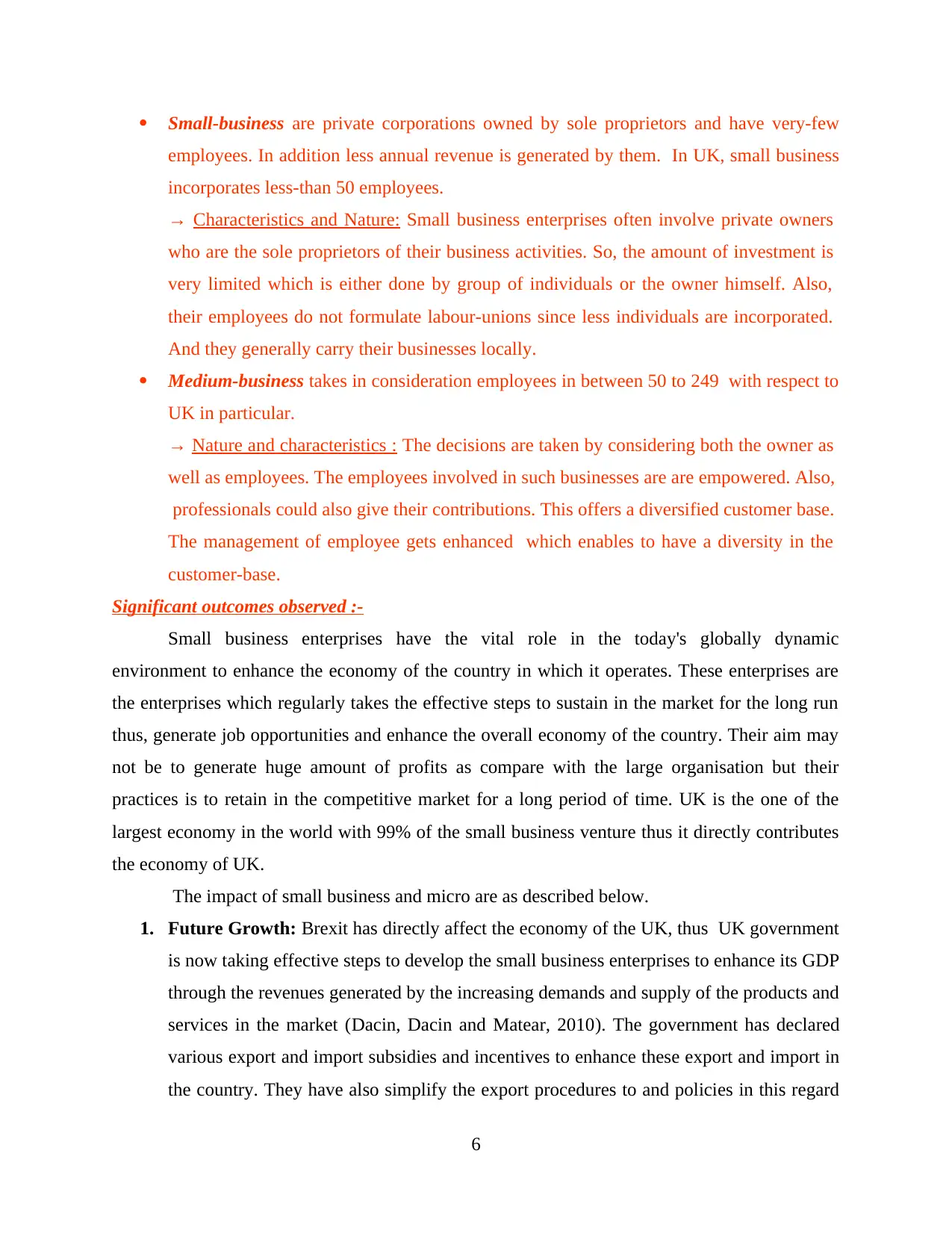
Small-business are private corporations owned by sole proprietors and have very-few
employees. In addition less annual revenue is generated by them. In UK, small business
incorporates less-than 50 employees.
→ Characteristics and Nature: Small business enterprises often involve private owners
who are the sole proprietors of their business activities. So, the amount of investment is
very limited which is either done by group of individuals or the owner himself. Also,
their employees do not formulate labour-unions since less individuals are incorporated.
And they generally carry their businesses locally.
Medium-business takes in consideration employees in between 50 to 249 with respect to
UK in particular.
→ Nature and characteristics : The decisions are taken by considering both the owner as
well as employees. The employees involved in such businesses are are empowered. Also,
professionals could also give their contributions. This offers a diversified customer base.
The management of employee gets enhanced which enables to have a diversity in the
customer-base.
Significant outcomes observed :-
Small business enterprises have the vital role in the today's globally dynamic
environment to enhance the economy of the country in which it operates. These enterprises are
the enterprises which regularly takes the effective steps to sustain in the market for the long run
thus, generate job opportunities and enhance the overall economy of the country. Their aim may
not be to generate huge amount of profits as compare with the large organisation but their
practices is to retain in the competitive market for a long period of time. UK is the one of the
largest economy in the world with 99% of the small business venture thus it directly contributes
the economy of UK.
The impact of small business and micro are as described below.
1. Future Growth: Brexit has directly affect the economy of the UK, thus UK government
is now taking effective steps to develop the small business enterprises to enhance its GDP
through the revenues generated by the increasing demands and supply of the products and
services in the market (Dacin, Dacin and Matear, 2010). The government has declared
various export and import subsidies and incentives to enhance these export and import in
the country. They have also simplify the export procedures to and policies in this regard
6
employees. In addition less annual revenue is generated by them. In UK, small business
incorporates less-than 50 employees.
→ Characteristics and Nature: Small business enterprises often involve private owners
who are the sole proprietors of their business activities. So, the amount of investment is
very limited which is either done by group of individuals or the owner himself. Also,
their employees do not formulate labour-unions since less individuals are incorporated.
And they generally carry their businesses locally.
Medium-business takes in consideration employees in between 50 to 249 with respect to
UK in particular.
→ Nature and characteristics : The decisions are taken by considering both the owner as
well as employees. The employees involved in such businesses are are empowered. Also,
professionals could also give their contributions. This offers a diversified customer base.
The management of employee gets enhanced which enables to have a diversity in the
customer-base.
Significant outcomes observed :-
Small business enterprises have the vital role in the today's globally dynamic
environment to enhance the economy of the country in which it operates. These enterprises are
the enterprises which regularly takes the effective steps to sustain in the market for the long run
thus, generate job opportunities and enhance the overall economy of the country. Their aim may
not be to generate huge amount of profits as compare with the large organisation but their
practices is to retain in the competitive market for a long period of time. UK is the one of the
largest economy in the world with 99% of the small business venture thus it directly contributes
the economy of UK.
The impact of small business and micro are as described below.
1. Future Growth: Brexit has directly affect the economy of the UK, thus UK government
is now taking effective steps to develop the small business enterprises to enhance its GDP
through the revenues generated by the increasing demands and supply of the products and
services in the market (Dacin, Dacin and Matear, 2010). The government has declared
various export and import subsidies and incentives to enhance these export and import in
the country. They have also simplify the export procedures to and policies in this regard
6
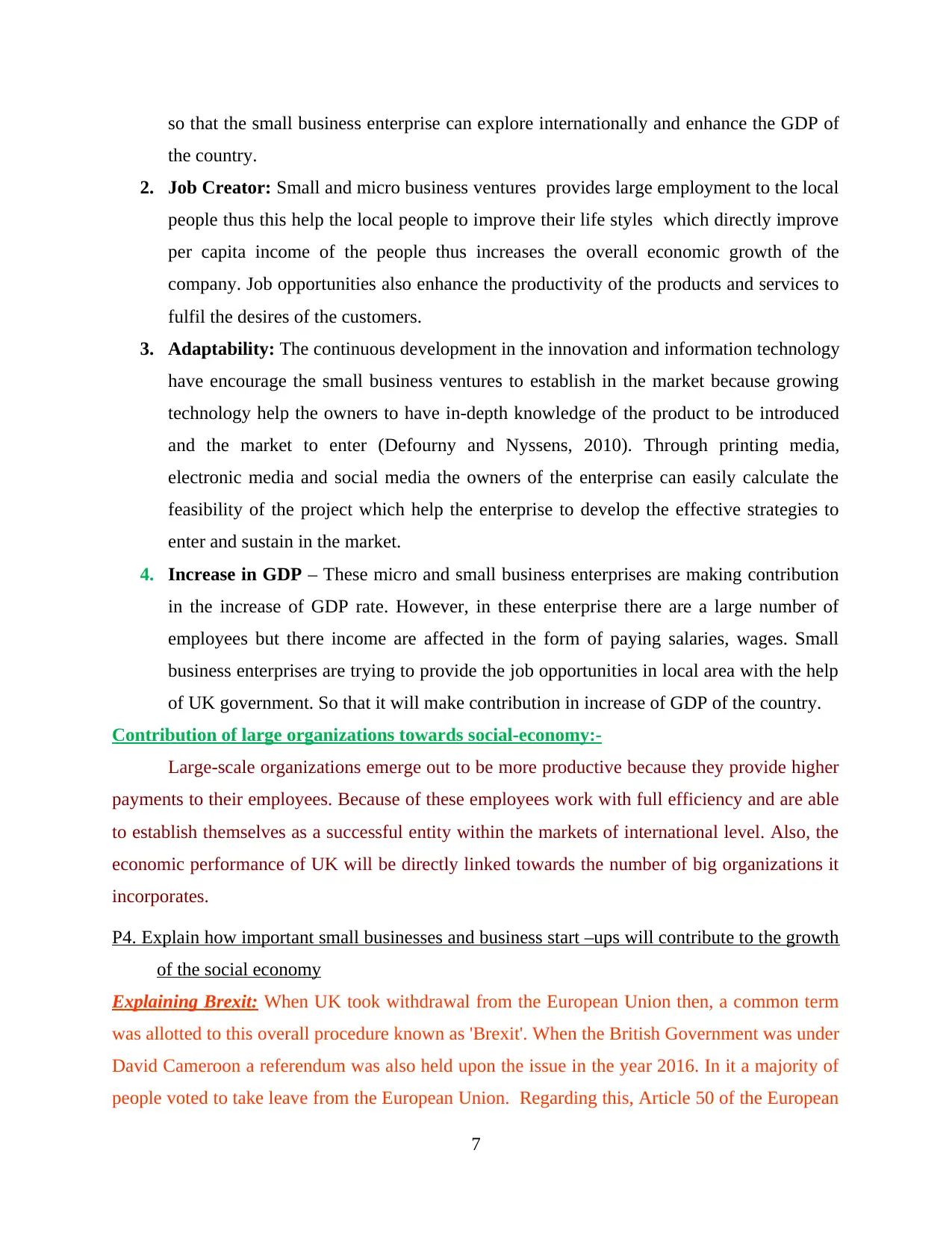
so that the small business enterprise can explore internationally and enhance the GDP of
the country.
2. Job Creator: Small and micro business ventures provides large employment to the local
people thus this help the local people to improve their life styles which directly improve
per capita income of the people thus increases the overall economic growth of the
company. Job opportunities also enhance the productivity of the products and services to
fulfil the desires of the customers.
3. Adaptability: The continuous development in the innovation and information technology
have encourage the small business ventures to establish in the market because growing
technology help the owners to have in-depth knowledge of the product to be introduced
and the market to enter (Defourny and Nyssens, 2010). Through printing media,
electronic media and social media the owners of the enterprise can easily calculate the
feasibility of the project which help the enterprise to develop the effective strategies to
enter and sustain in the market.
4. Increase in GDP – These micro and small business enterprises are making contribution
in the increase of GDP rate. However, in these enterprise there are a large number of
employees but there income are affected in the form of paying salaries, wages. Small
business enterprises are trying to provide the job opportunities in local area with the help
of UK government. So that it will make contribution in increase of GDP of the country.
Contribution of large organizations towards social-economy:-
Large-scale organizations emerge out to be more productive because they provide higher
payments to their employees. Because of these employees work with full efficiency and are able
to establish themselves as a successful entity within the markets of international level. Also, the
economic performance of UK will be directly linked towards the number of big organizations it
incorporates.
P4. Explain how important small businesses and business start –ups will contribute to the growth
of the social economy
Explaining Brexit: When UK took withdrawal from the European Union then, a common term
was allotted to this overall procedure known as 'Brexit'. When the British Government was under
David Cameroon a referendum was also held upon the issue in the year 2016. In it a majority of
people voted to take leave from the European Union. Regarding this, Article 50 of the European
7
the country.
2. Job Creator: Small and micro business ventures provides large employment to the local
people thus this help the local people to improve their life styles which directly improve
per capita income of the people thus increases the overall economic growth of the
company. Job opportunities also enhance the productivity of the products and services to
fulfil the desires of the customers.
3. Adaptability: The continuous development in the innovation and information technology
have encourage the small business ventures to establish in the market because growing
technology help the owners to have in-depth knowledge of the product to be introduced
and the market to enter (Defourny and Nyssens, 2010). Through printing media,
electronic media and social media the owners of the enterprise can easily calculate the
feasibility of the project which help the enterprise to develop the effective strategies to
enter and sustain in the market.
4. Increase in GDP – These micro and small business enterprises are making contribution
in the increase of GDP rate. However, in these enterprise there are a large number of
employees but there income are affected in the form of paying salaries, wages. Small
business enterprises are trying to provide the job opportunities in local area with the help
of UK government. So that it will make contribution in increase of GDP of the country.
Contribution of large organizations towards social-economy:-
Large-scale organizations emerge out to be more productive because they provide higher
payments to their employees. Because of these employees work with full efficiency and are able
to establish themselves as a successful entity within the markets of international level. Also, the
economic performance of UK will be directly linked towards the number of big organizations it
incorporates.
P4. Explain how important small businesses and business start –ups will contribute to the growth
of the social economy
Explaining Brexit: When UK took withdrawal from the European Union then, a common term
was allotted to this overall procedure known as 'Brexit'. When the British Government was under
David Cameroon a referendum was also held upon the issue in the year 2016. In it a majority of
people voted to take leave from the European Union. Regarding this, Article 50 of the European
7
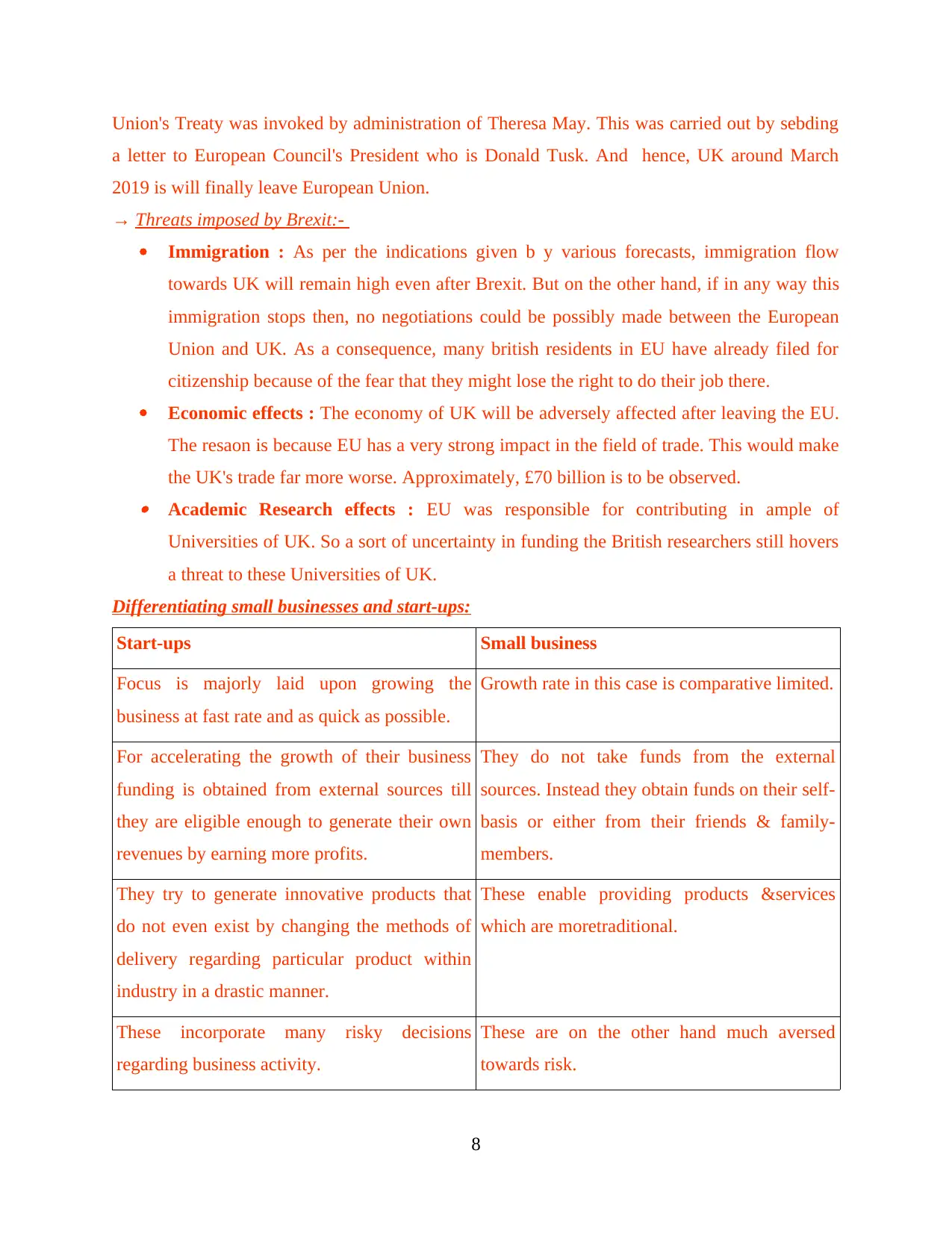
Union's Treaty was invoked by administration of Theresa May. This was carried out by sebding
a letter to European Council's President who is Donald Tusk. And hence, UK around March
2019 is will finally leave European Union.
→ Threats imposed by Brexit:-
Immigration : As per the indications given b y various forecasts, immigration flow
towards UK will remain high even after Brexit. But on the other hand, if in any way this
immigration stops then, no negotiations could be possibly made between the European
Union and UK. As a consequence, many british residents in EU have already filed for
citizenship because of the fear that they might lose the right to do their job there.
Economic effects : The economy of UK will be adversely affected after leaving the EU.
The resaon is because EU has a very strong impact in the field of trade. This would make
the UK's trade far more worse. Approximately, £70 billion is to be observed. Academic Research effects : EU was responsible for contributing in ample of
Universities of UK. So a sort of uncertainty in funding the British researchers still hovers
a threat to these Universities of UK.
Differentiating small businesses and start-ups:
Start-ups Small business
Focus is majorly laid upon growing the
business at fast rate and as quick as possible.
Growth rate in this case is comparative limited.
For accelerating the growth of their business
funding is obtained from external sources till
they are eligible enough to generate their own
revenues by earning more profits.
They do not take funds from the external
sources. Instead they obtain funds on their self-
basis or either from their friends & family-
members.
They try to generate innovative products that
do not even exist by changing the methods of
delivery regarding particular product within
industry in a drastic manner.
These enable providing products &services
which are moretraditional.
These incorporate many risky decisions
regarding business activity.
These are on the other hand much aversed
towards risk.
8
a letter to European Council's President who is Donald Tusk. And hence, UK around March
2019 is will finally leave European Union.
→ Threats imposed by Brexit:-
Immigration : As per the indications given b y various forecasts, immigration flow
towards UK will remain high even after Brexit. But on the other hand, if in any way this
immigration stops then, no negotiations could be possibly made between the European
Union and UK. As a consequence, many british residents in EU have already filed for
citizenship because of the fear that they might lose the right to do their job there.
Economic effects : The economy of UK will be adversely affected after leaving the EU.
The resaon is because EU has a very strong impact in the field of trade. This would make
the UK's trade far more worse. Approximately, £70 billion is to be observed. Academic Research effects : EU was responsible for contributing in ample of
Universities of UK. So a sort of uncertainty in funding the British researchers still hovers
a threat to these Universities of UK.
Differentiating small businesses and start-ups:
Start-ups Small business
Focus is majorly laid upon growing the
business at fast rate and as quick as possible.
Growth rate in this case is comparative limited.
For accelerating the growth of their business
funding is obtained from external sources till
they are eligible enough to generate their own
revenues by earning more profits.
They do not take funds from the external
sources. Instead they obtain funds on their self-
basis or either from their friends & family-
members.
They try to generate innovative products that
do not even exist by changing the methods of
delivery regarding particular product within
industry in a drastic manner.
These enable providing products &services
which are moretraditional.
These incorporate many risky decisions
regarding business activity.
These are on the other hand much aversed
towards risk.
8
Secure Best Marks with AI Grader
Need help grading? Try our AI Grader for instant feedback on your assignments.
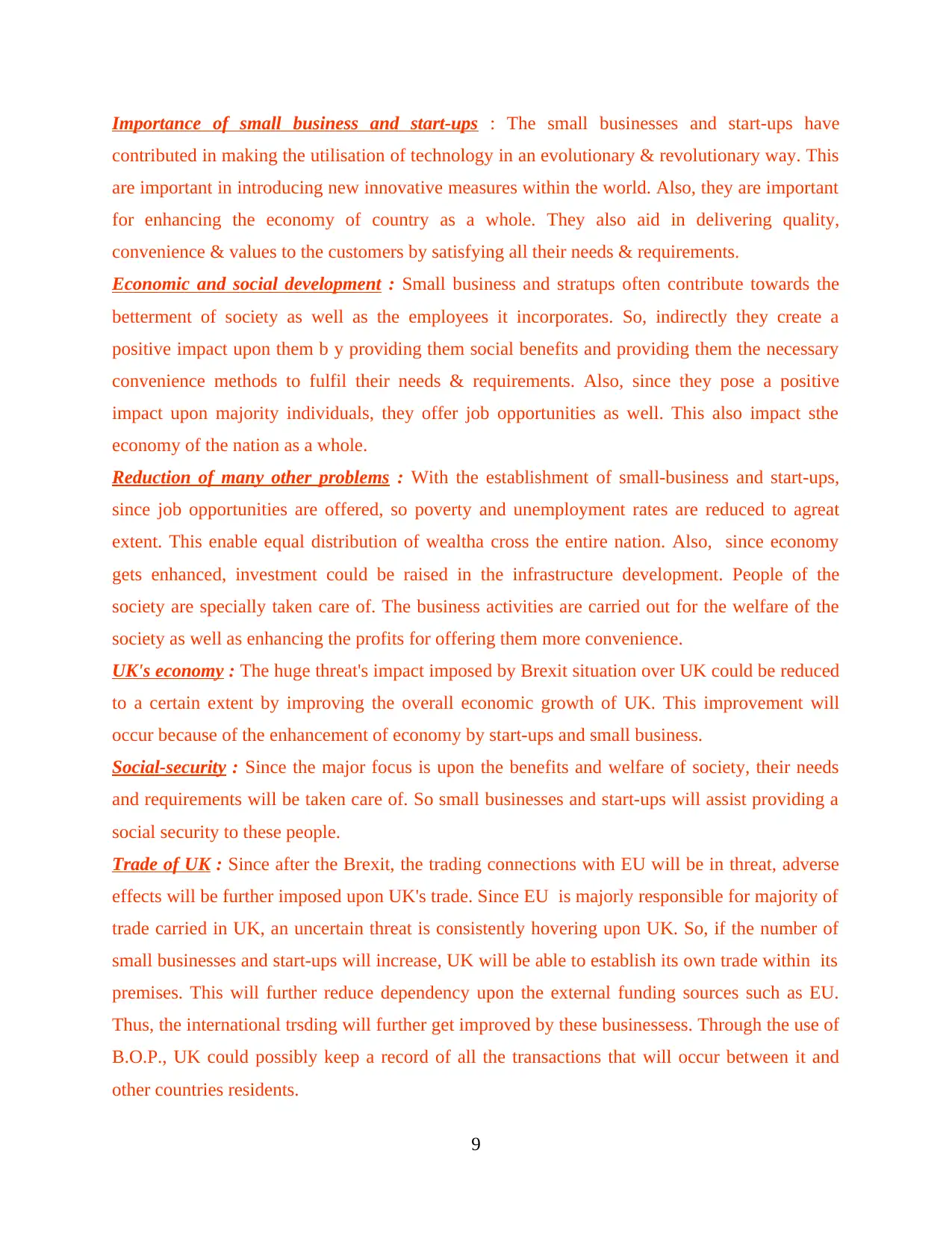
Importance of small business and start-ups : The small businesses and start-ups have
contributed in making the utilisation of technology in an evolutionary & revolutionary way. This
are important in introducing new innovative measures within the world. Also, they are important
for enhancing the economy of country as a whole. They also aid in delivering quality,
convenience & values to the customers by satisfying all their needs & requirements.
Economic and social development : Small business and stratups often contribute towards the
betterment of society as well as the employees it incorporates. So, indirectly they create a
positive impact upon them b y providing them social benefits and providing them the necessary
convenience methods to fulfil their needs & requirements. Also, since they pose a positive
impact upon majority individuals, they offer job opportunities as well. This also impact sthe
economy of the nation as a whole.
Reduction of many other problems : With the establishment of small-business and start-ups,
since job opportunities are offered, so poverty and unemployment rates are reduced to agreat
extent. This enable equal distribution of wealtha cross the entire nation. Also, since economy
gets enhanced, investment could be raised in the infrastructure development. People of the
society are specially taken care of. The business activities are carried out for the welfare of the
society as well as enhancing the profits for offering them more convenience.
UK's economy : The huge threat's impact imposed by Brexit situation over UK could be reduced
to a certain extent by improving the overall economic growth of UK. This improvement will
occur because of the enhancement of economy by start-ups and small business.
Social-security : Since the major focus is upon the benefits and welfare of society, their needs
and requirements will be taken care of. So small businesses and start-ups will assist providing a
social security to these people.
Trade of UK : Since after the Brexit, the trading connections with EU will be in threat, adverse
effects will be further imposed upon UK's trade. Since EU is majorly responsible for majority of
trade carried in UK, an uncertain threat is consistently hovering upon UK. So, if the number of
small businesses and start-ups will increase, UK will be able to establish its own trade within its
premises. This will further reduce dependency upon the external funding sources such as EU.
Thus, the international trsding will further get improved by these businessess. Through the use of
B.O.P., UK could possibly keep a record of all the transactions that will occur between it and
other countries residents.
9
contributed in making the utilisation of technology in an evolutionary & revolutionary way. This
are important in introducing new innovative measures within the world. Also, they are important
for enhancing the economy of country as a whole. They also aid in delivering quality,
convenience & values to the customers by satisfying all their needs & requirements.
Economic and social development : Small business and stratups often contribute towards the
betterment of society as well as the employees it incorporates. So, indirectly they create a
positive impact upon them b y providing them social benefits and providing them the necessary
convenience methods to fulfil their needs & requirements. Also, since they pose a positive
impact upon majority individuals, they offer job opportunities as well. This also impact sthe
economy of the nation as a whole.
Reduction of many other problems : With the establishment of small-business and start-ups,
since job opportunities are offered, so poverty and unemployment rates are reduced to agreat
extent. This enable equal distribution of wealtha cross the entire nation. Also, since economy
gets enhanced, investment could be raised in the infrastructure development. People of the
society are specially taken care of. The business activities are carried out for the welfare of the
society as well as enhancing the profits for offering them more convenience.
UK's economy : The huge threat's impact imposed by Brexit situation over UK could be reduced
to a certain extent by improving the overall economic growth of UK. This improvement will
occur because of the enhancement of economy by start-ups and small business.
Social-security : Since the major focus is upon the benefits and welfare of society, their needs
and requirements will be taken care of. So small businesses and start-ups will assist providing a
social security to these people.
Trade of UK : Since after the Brexit, the trading connections with EU will be in threat, adverse
effects will be further imposed upon UK's trade. Since EU is majorly responsible for majority of
trade carried in UK, an uncertain threat is consistently hovering upon UK. So, if the number of
small businesses and start-ups will increase, UK will be able to establish its own trade within its
premises. This will further reduce dependency upon the external funding sources such as EU.
Thus, the international trsding will further get improved by these businessess. Through the use of
B.O.P., UK could possibly keep a record of all the transactions that will occur between it and
other countries residents.
9
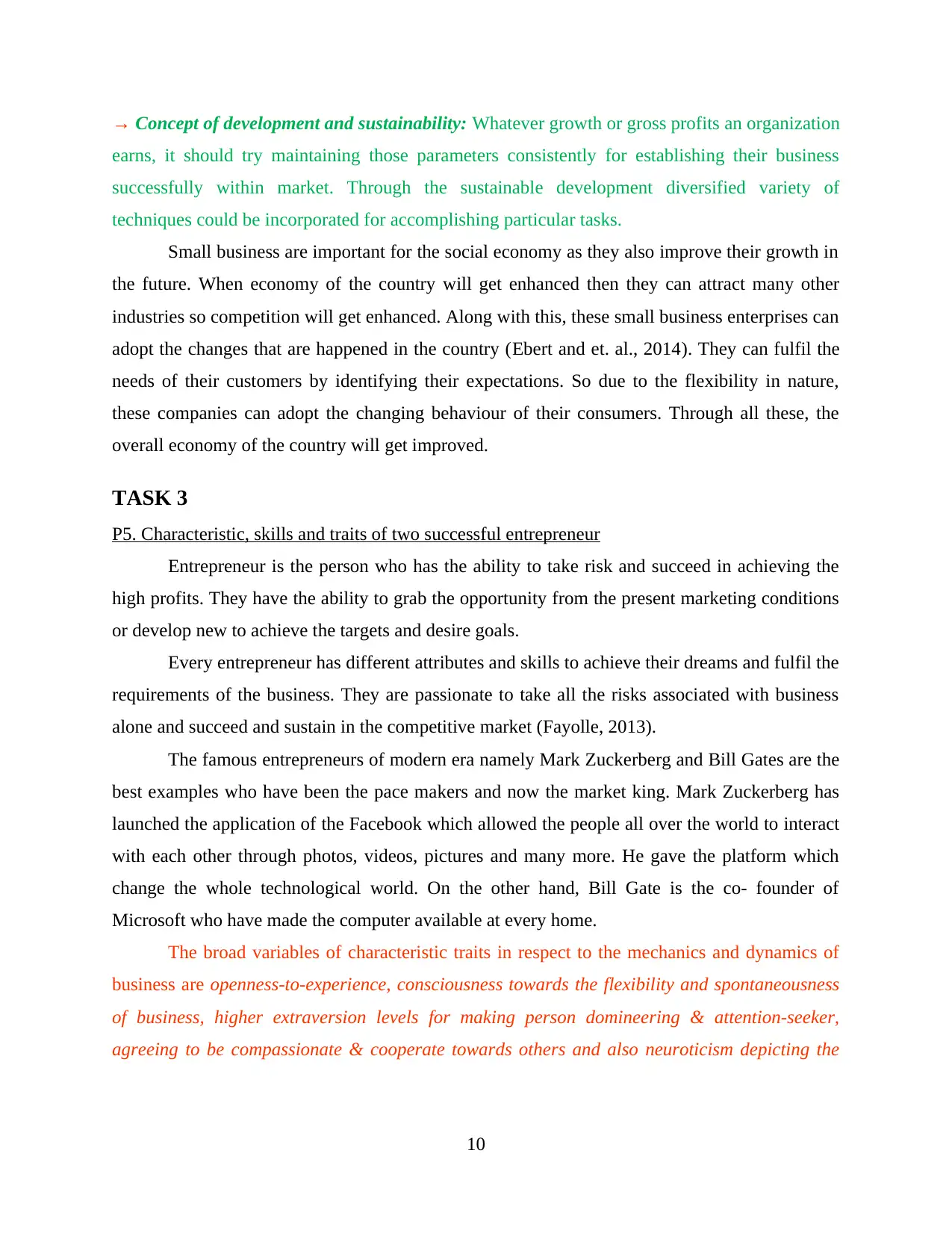
→ Concept of development and sustainability: Whatever growth or gross profits an organization
earns, it should try maintaining those parameters consistently for establishing their business
successfully within market. Through the sustainable development diversified variety of
techniques could be incorporated for accomplishing particular tasks.
Small business are important for the social economy as they also improve their growth in
the future. When economy of the country will get enhanced then they can attract many other
industries so competition will get enhanced. Along with this, these small business enterprises can
adopt the changes that are happened in the country (Ebert and et. al., 2014). They can fulfil the
needs of their customers by identifying their expectations. So due to the flexibility in nature,
these companies can adopt the changing behaviour of their consumers. Through all these, the
overall economy of the country will get improved.
TASK 3
P5. Characteristic, skills and traits of two successful entrepreneur
Entrepreneur is the person who has the ability to take risk and succeed in achieving the
high profits. They have the ability to grab the opportunity from the present marketing conditions
or develop new to achieve the targets and desire goals.
Every entrepreneur has different attributes and skills to achieve their dreams and fulfil the
requirements of the business. They are passionate to take all the risks associated with business
alone and succeed and sustain in the competitive market (Fayolle, 2013).
The famous entrepreneurs of modern era namely Mark Zuckerberg and Bill Gates are the
best examples who have been the pace makers and now the market king. Mark Zuckerberg has
launched the application of the Facebook which allowed the people all over the world to interact
with each other through photos, videos, pictures and many more. He gave the platform which
change the whole technological world. On the other hand, Bill Gate is the co- founder of
Microsoft who have made the computer available at every home.
The broad variables of characteristic traits in respect to the mechanics and dynamics of
business are openness-to-experience, consciousness towards the flexibility and spontaneousness
of business, higher extraversion levels for making person domineering & attention-seeker,
agreeing to be compassionate & cooperate towards others and also neuroticism depicting the
10
earns, it should try maintaining those parameters consistently for establishing their business
successfully within market. Through the sustainable development diversified variety of
techniques could be incorporated for accomplishing particular tasks.
Small business are important for the social economy as they also improve their growth in
the future. When economy of the country will get enhanced then they can attract many other
industries so competition will get enhanced. Along with this, these small business enterprises can
adopt the changes that are happened in the country (Ebert and et. al., 2014). They can fulfil the
needs of their customers by identifying their expectations. So due to the flexibility in nature,
these companies can adopt the changing behaviour of their consumers. Through all these, the
overall economy of the country will get improved.
TASK 3
P5. Characteristic, skills and traits of two successful entrepreneur
Entrepreneur is the person who has the ability to take risk and succeed in achieving the
high profits. They have the ability to grab the opportunity from the present marketing conditions
or develop new to achieve the targets and desire goals.
Every entrepreneur has different attributes and skills to achieve their dreams and fulfil the
requirements of the business. They are passionate to take all the risks associated with business
alone and succeed and sustain in the competitive market (Fayolle, 2013).
The famous entrepreneurs of modern era namely Mark Zuckerberg and Bill Gates are the
best examples who have been the pace makers and now the market king. Mark Zuckerberg has
launched the application of the Facebook which allowed the people all over the world to interact
with each other through photos, videos, pictures and many more. He gave the platform which
change the whole technological world. On the other hand, Bill Gate is the co- founder of
Microsoft who have made the computer available at every home.
The broad variables of characteristic traits in respect to the mechanics and dynamics of
business are openness-to-experience, consciousness towards the flexibility and spontaneousness
of business, higher extraversion levels for making person domineering & attention-seeker,
agreeing to be compassionate & cooperate towards others and also neuroticism depicting the
10
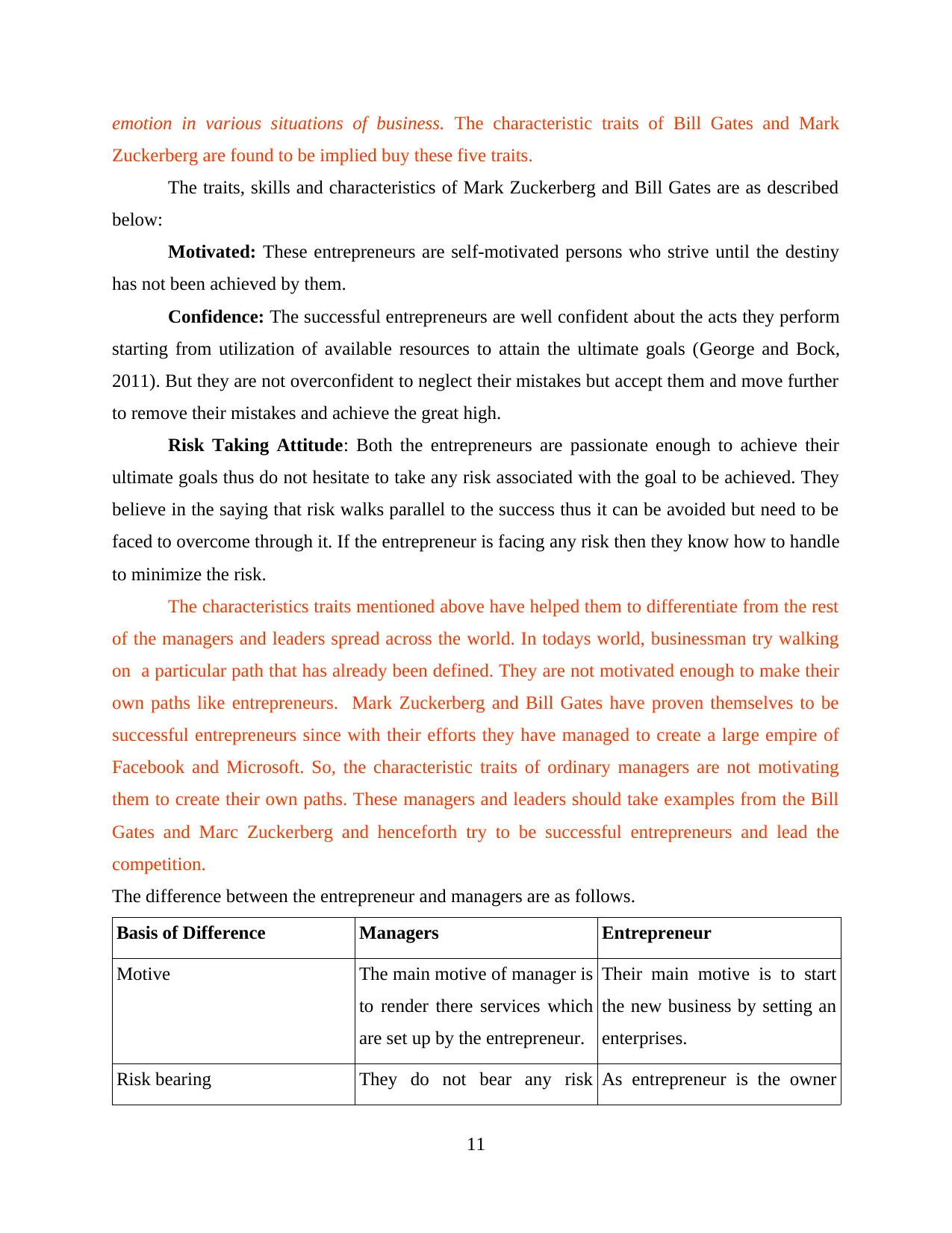
emotion in various situations of business. The characteristic traits of Bill Gates and Mark
Zuckerberg are found to be implied buy these five traits.
The traits, skills and characteristics of Mark Zuckerberg and Bill Gates are as described
below:
Motivated: These entrepreneurs are self-motivated persons who strive until the destiny
has not been achieved by them.
Confidence: The successful entrepreneurs are well confident about the acts they perform
starting from utilization of available resources to attain the ultimate goals (George and Bock,
2011). But they are not overconfident to neglect their mistakes but accept them and move further
to remove their mistakes and achieve the great high.
Risk Taking Attitude: Both the entrepreneurs are passionate enough to achieve their
ultimate goals thus do not hesitate to take any risk associated with the goal to be achieved. They
believe in the saying that risk walks parallel to the success thus it can be avoided but need to be
faced to overcome through it. If the entrepreneur is facing any risk then they know how to handle
to minimize the risk.
The characteristics traits mentioned above have helped them to differentiate from the rest
of the managers and leaders spread across the world. In todays world, businessman try walking
on a particular path that has already been defined. They are not motivated enough to make their
own paths like entrepreneurs. Mark Zuckerberg and Bill Gates have proven themselves to be
successful entrepreneurs since with their efforts they have managed to create a large empire of
Facebook and Microsoft. So, the characteristic traits of ordinary managers are not motivating
them to create their own paths. These managers and leaders should take examples from the Bill
Gates and Marc Zuckerberg and henceforth try to be successful entrepreneurs and lead the
competition.
The difference between the entrepreneur and managers are as follows.
Basis of Difference Managers Entrepreneur
Motive The main motive of manager is
to render there services which
are set up by the entrepreneur.
Their main motive is to start
the new business by setting an
enterprises.
Risk bearing They do not bear any risk As entrepreneur is the owner
11
Zuckerberg are found to be implied buy these five traits.
The traits, skills and characteristics of Mark Zuckerberg and Bill Gates are as described
below:
Motivated: These entrepreneurs are self-motivated persons who strive until the destiny
has not been achieved by them.
Confidence: The successful entrepreneurs are well confident about the acts they perform
starting from utilization of available resources to attain the ultimate goals (George and Bock,
2011). But they are not overconfident to neglect their mistakes but accept them and move further
to remove their mistakes and achieve the great high.
Risk Taking Attitude: Both the entrepreneurs are passionate enough to achieve their
ultimate goals thus do not hesitate to take any risk associated with the goal to be achieved. They
believe in the saying that risk walks parallel to the success thus it can be avoided but need to be
faced to overcome through it. If the entrepreneur is facing any risk then they know how to handle
to minimize the risk.
The characteristics traits mentioned above have helped them to differentiate from the rest
of the managers and leaders spread across the world. In todays world, businessman try walking
on a particular path that has already been defined. They are not motivated enough to make their
own paths like entrepreneurs. Mark Zuckerberg and Bill Gates have proven themselves to be
successful entrepreneurs since with their efforts they have managed to create a large empire of
Facebook and Microsoft. So, the characteristic traits of ordinary managers are not motivating
them to create their own paths. These managers and leaders should take examples from the Bill
Gates and Marc Zuckerberg and henceforth try to be successful entrepreneurs and lead the
competition.
The difference between the entrepreneur and managers are as follows.
Basis of Difference Managers Entrepreneur
Motive The main motive of manager is
to render there services which
are set up by the entrepreneur.
Their main motive is to start
the new business by setting an
enterprises.
Risk bearing They do not bear any risk As entrepreneur is the owner
11
Paraphrase This Document
Need a fresh take? Get an instant paraphrase of this document with our AI Paraphraser
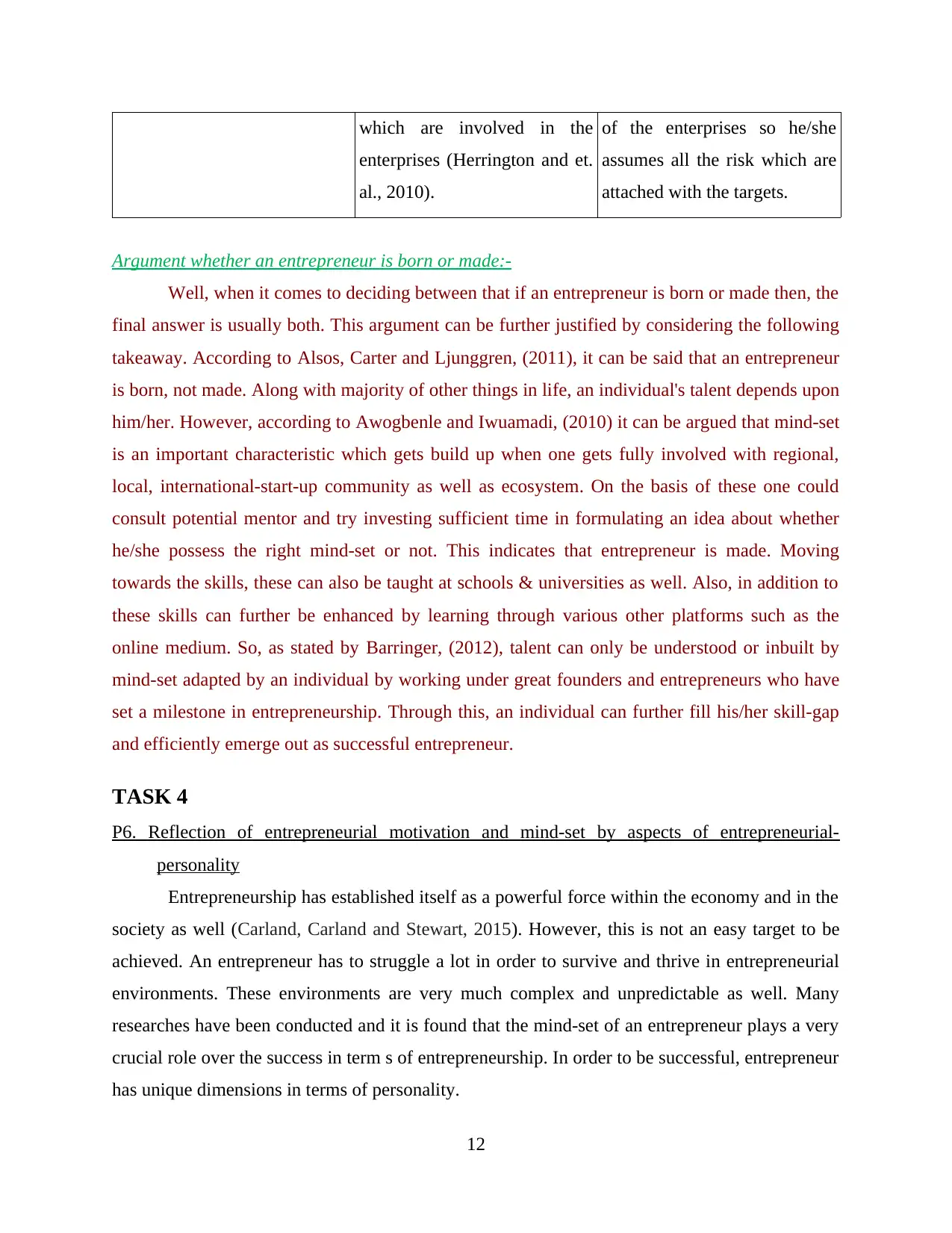
which are involved in the
enterprises (Herrington and et.
al., 2010).
of the enterprises so he/she
assumes all the risk which are
attached with the targets.
Argument whether an entrepreneur is born or made:-
Well, when it comes to deciding between that if an entrepreneur is born or made then, the
final answer is usually both. This argument can be further justified by considering the following
takeaway. According to Alsos, Carter and Ljunggren, (2011), it can be said that an entrepreneur
is born, not made. Along with majority of other things in life, an individual's talent depends upon
him/her. However, according to Awogbenle and Iwuamadi, (2010) it can be argued that mind-set
is an important characteristic which gets build up when one gets fully involved with regional,
local, international-start-up community as well as ecosystem. On the basis of these one could
consult potential mentor and try investing sufficient time in formulating an idea about whether
he/she possess the right mind-set or not. This indicates that entrepreneur is made. Moving
towards the skills, these can also be taught at schools & universities as well. Also, in addition to
these skills can further be enhanced by learning through various other platforms such as the
online medium. So, as stated by Barringer, (2012), talent can only be understood or inbuilt by
mind-set adapted by an individual by working under great founders and entrepreneurs who have
set a milestone in entrepreneurship. Through this, an individual can further fill his/her skill-gap
and efficiently emerge out as successful entrepreneur.
TASK 4
P6. Reflection of entrepreneurial motivation and mind-set by aspects of entrepreneurial-
personality
Entrepreneurship has established itself as a powerful force within the economy and in the
society as well (Carland, Carland and Stewart, 2015). However, this is not an easy target to be
achieved. An entrepreneur has to struggle a lot in order to survive and thrive in entrepreneurial
environments. These environments are very much complex and unpredictable as well. Many
researches have been conducted and it is found that the mind-set of an entrepreneur plays a very
crucial role over the success in term s of entrepreneurship. In order to be successful, entrepreneur
has unique dimensions in terms of personality.
12
enterprises (Herrington and et.
al., 2010).
of the enterprises so he/she
assumes all the risk which are
attached with the targets.
Argument whether an entrepreneur is born or made:-
Well, when it comes to deciding between that if an entrepreneur is born or made then, the
final answer is usually both. This argument can be further justified by considering the following
takeaway. According to Alsos, Carter and Ljunggren, (2011), it can be said that an entrepreneur
is born, not made. Along with majority of other things in life, an individual's talent depends upon
him/her. However, according to Awogbenle and Iwuamadi, (2010) it can be argued that mind-set
is an important characteristic which gets build up when one gets fully involved with regional,
local, international-start-up community as well as ecosystem. On the basis of these one could
consult potential mentor and try investing sufficient time in formulating an idea about whether
he/she possess the right mind-set or not. This indicates that entrepreneur is made. Moving
towards the skills, these can also be taught at schools & universities as well. Also, in addition to
these skills can further be enhanced by learning through various other platforms such as the
online medium. So, as stated by Barringer, (2012), talent can only be understood or inbuilt by
mind-set adapted by an individual by working under great founders and entrepreneurs who have
set a milestone in entrepreneurship. Through this, an individual can further fill his/her skill-gap
and efficiently emerge out as successful entrepreneur.
TASK 4
P6. Reflection of entrepreneurial motivation and mind-set by aspects of entrepreneurial-
personality
Entrepreneurship has established itself as a powerful force within the economy and in the
society as well (Carland, Carland and Stewart, 2015). However, this is not an easy target to be
achieved. An entrepreneur has to struggle a lot in order to survive and thrive in entrepreneurial
environments. These environments are very much complex and unpredictable as well. Many
researches have been conducted and it is found that the mind-set of an entrepreneur plays a very
crucial role over the success in term s of entrepreneurship. In order to be successful, entrepreneur
has unique dimensions in terms of personality.
12
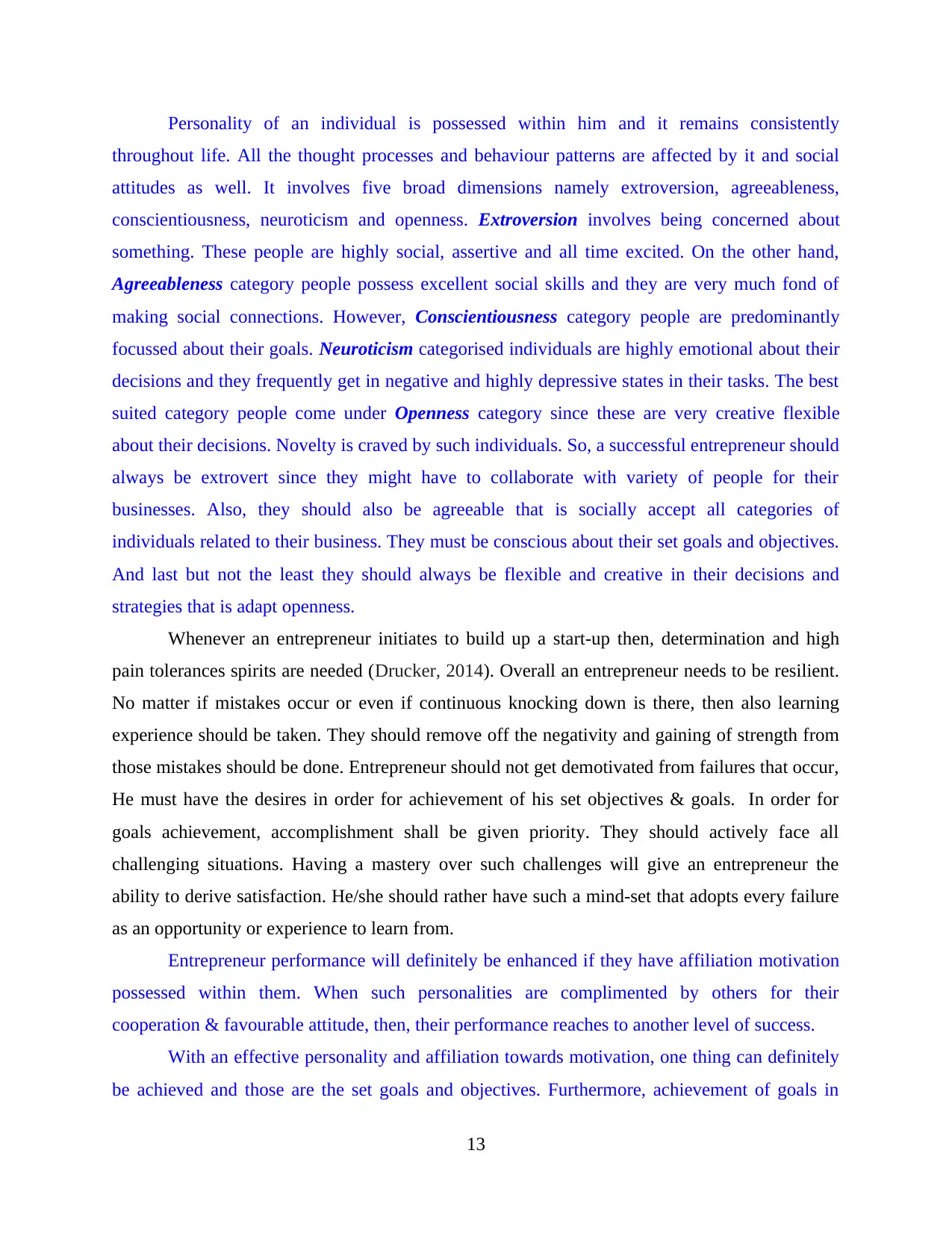
Personality of an individual is possessed within him and it remains consistently
throughout life. All the thought processes and behaviour patterns are affected by it and social
attitudes as well. It involves five broad dimensions namely extroversion, agreeableness,
conscientiousness, neuroticism and openness. Extroversion involves being concerned about
something. These people are highly social, assertive and all time excited. On the other hand,
Agreeableness category people possess excellent social skills and they are very much fond of
making social connections. However, Conscientiousness category people are predominantly
focussed about their goals. Neuroticism categorised individuals are highly emotional about their
decisions and they frequently get in negative and highly depressive states in their tasks. The best
suited category people come under Openness category since these are very creative flexible
about their decisions. Novelty is craved by such individuals. So, a successful entrepreneur should
always be extrovert since they might have to collaborate with variety of people for their
businesses. Also, they should also be agreeable that is socially accept all categories of
individuals related to their business. They must be conscious about their set goals and objectives.
And last but not the least they should always be flexible and creative in their decisions and
strategies that is adapt openness.
Whenever an entrepreneur initiates to build up a start-up then, determination and high
pain tolerances spirits are needed (Drucker, 2014). Overall an entrepreneur needs to be resilient.
No matter if mistakes occur or even if continuous knocking down is there, then also learning
experience should be taken. They should remove off the negativity and gaining of strength from
those mistakes should be done. Entrepreneur should not get demotivated from failures that occur,
He must have the desires in order for achievement of his set objectives & goals. In order for
goals achievement, accomplishment shall be given priority. They should actively face all
challenging situations. Having a mastery over such challenges will give an entrepreneur the
ability to derive satisfaction. He/she should rather have such a mind-set that adopts every failure
as an opportunity or experience to learn from.
Entrepreneur performance will definitely be enhanced if they have affiliation motivation
possessed within them. When such personalities are complimented by others for their
cooperation & favourable attitude, then, their performance reaches to another level of success.
With an effective personality and affiliation towards motivation, one thing can definitely
be achieved and those are the set goals and objectives. Furthermore, achievement of goals in
13
throughout life. All the thought processes and behaviour patterns are affected by it and social
attitudes as well. It involves five broad dimensions namely extroversion, agreeableness,
conscientiousness, neuroticism and openness. Extroversion involves being concerned about
something. These people are highly social, assertive and all time excited. On the other hand,
Agreeableness category people possess excellent social skills and they are very much fond of
making social connections. However, Conscientiousness category people are predominantly
focussed about their goals. Neuroticism categorised individuals are highly emotional about their
decisions and they frequently get in negative and highly depressive states in their tasks. The best
suited category people come under Openness category since these are very creative flexible
about their decisions. Novelty is craved by such individuals. So, a successful entrepreneur should
always be extrovert since they might have to collaborate with variety of people for their
businesses. Also, they should also be agreeable that is socially accept all categories of
individuals related to their business. They must be conscious about their set goals and objectives.
And last but not the least they should always be flexible and creative in their decisions and
strategies that is adapt openness.
Whenever an entrepreneur initiates to build up a start-up then, determination and high
pain tolerances spirits are needed (Drucker, 2014). Overall an entrepreneur needs to be resilient.
No matter if mistakes occur or even if continuous knocking down is there, then also learning
experience should be taken. They should remove off the negativity and gaining of strength from
those mistakes should be done. Entrepreneur should not get demotivated from failures that occur,
He must have the desires in order for achievement of his set objectives & goals. In order for
goals achievement, accomplishment shall be given priority. They should actively face all
challenging situations. Having a mastery over such challenges will give an entrepreneur the
ability to derive satisfaction. He/she should rather have such a mind-set that adopts every failure
as an opportunity or experience to learn from.
Entrepreneur performance will definitely be enhanced if they have affiliation motivation
possessed within them. When such personalities are complimented by others for their
cooperation & favourable attitude, then, their performance reaches to another level of success.
With an effective personality and affiliation towards motivation, one thing can definitely
be achieved and those are the set goals and objectives. Furthermore, achievement of goals in
13
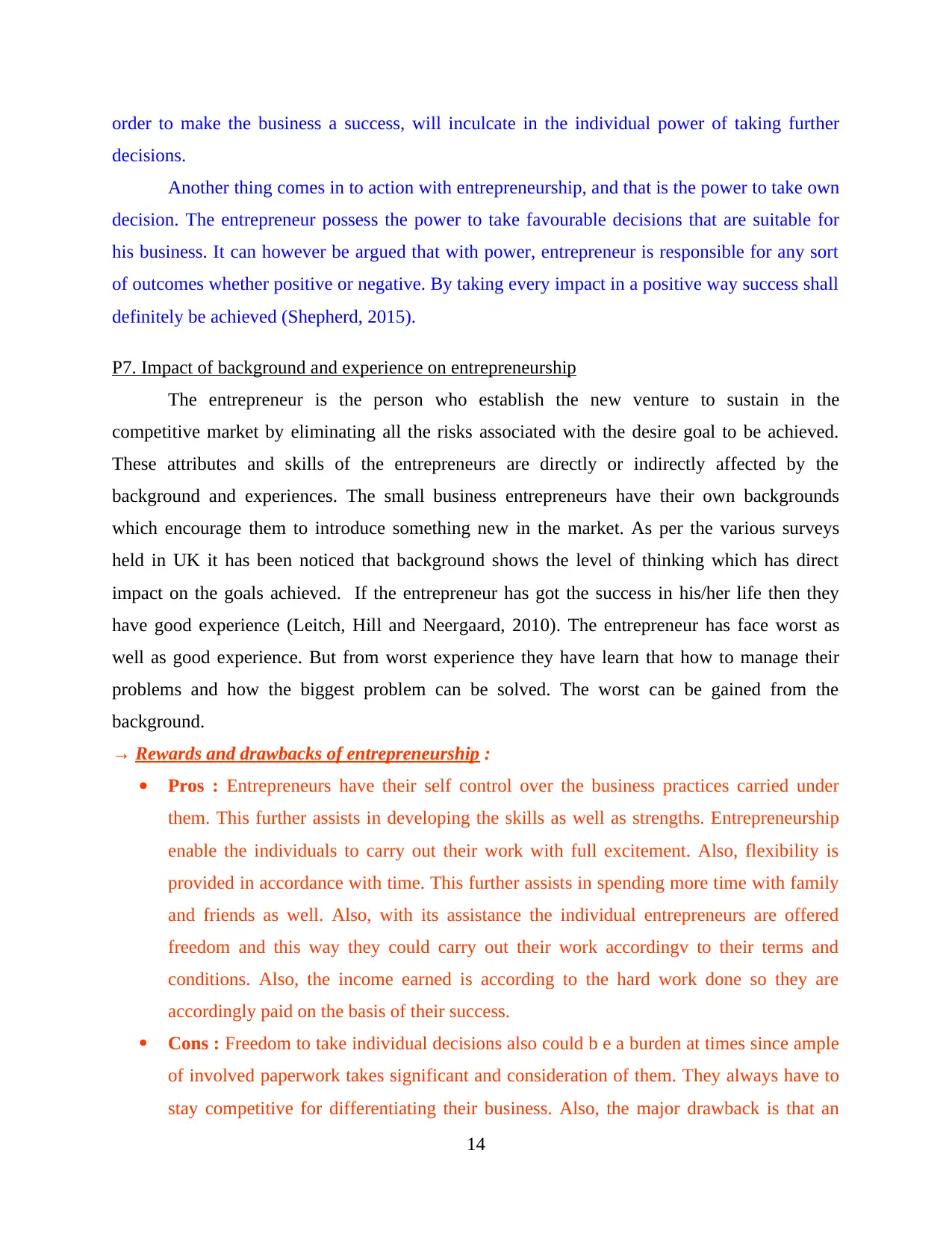
order to make the business a success, will inculcate in the individual power of taking further
decisions.
Another thing comes in to action with entrepreneurship, and that is the power to take own
decision. The entrepreneur possess the power to take favourable decisions that are suitable for
his business. It can however be argued that with power, entrepreneur is responsible for any sort
of outcomes whether positive or negative. By taking every impact in a positive way success shall
definitely be achieved (Shepherd, 2015).
P7. Impact of background and experience on entrepreneurship
The entrepreneur is the person who establish the new venture to sustain in the
competitive market by eliminating all the risks associated with the desire goal to be achieved.
These attributes and skills of the entrepreneurs are directly or indirectly affected by the
background and experiences. The small business entrepreneurs have their own backgrounds
which encourage them to introduce something new in the market. As per the various surveys
held in UK it has been noticed that background shows the level of thinking which has direct
impact on the goals achieved. If the entrepreneur has got the success in his/her life then they
have good experience (Leitch, Hill and Neergaard, 2010). The entrepreneur has face worst as
well as good experience. But from worst experience they have learn that how to manage their
problems and how the biggest problem can be solved. The worst can be gained from the
background.
→ Rewards and drawbacks of entrepreneurship :
Pros : Entrepreneurs have their self control over the business practices carried under
them. This further assists in developing the skills as well as strengths. Entrepreneurship
enable the individuals to carry out their work with full excitement. Also, flexibility is
provided in accordance with time. This further assists in spending more time with family
and friends as well. Also, with its assistance the individual entrepreneurs are offered
freedom and this way they could carry out their work accordingv to their terms and
conditions. Also, the income earned is according to the hard work done so they are
accordingly paid on the basis of their success.
Cons : Freedom to take individual decisions also could b e a burden at times since ample
of involved paperwork takes significant and consideration of them. They always have to
stay competitive for differentiating their business. Also, the major drawback is that an
14
decisions.
Another thing comes in to action with entrepreneurship, and that is the power to take own
decision. The entrepreneur possess the power to take favourable decisions that are suitable for
his business. It can however be argued that with power, entrepreneur is responsible for any sort
of outcomes whether positive or negative. By taking every impact in a positive way success shall
definitely be achieved (Shepherd, 2015).
P7. Impact of background and experience on entrepreneurship
The entrepreneur is the person who establish the new venture to sustain in the
competitive market by eliminating all the risks associated with the desire goal to be achieved.
These attributes and skills of the entrepreneurs are directly or indirectly affected by the
background and experiences. The small business entrepreneurs have their own backgrounds
which encourage them to introduce something new in the market. As per the various surveys
held in UK it has been noticed that background shows the level of thinking which has direct
impact on the goals achieved. If the entrepreneur has got the success in his/her life then they
have good experience (Leitch, Hill and Neergaard, 2010). The entrepreneur has face worst as
well as good experience. But from worst experience they have learn that how to manage their
problems and how the biggest problem can be solved. The worst can be gained from the
background.
→ Rewards and drawbacks of entrepreneurship :
Pros : Entrepreneurs have their self control over the business practices carried under
them. This further assists in developing the skills as well as strengths. Entrepreneurship
enable the individuals to carry out their work with full excitement. Also, flexibility is
provided in accordance with time. This further assists in spending more time with family
and friends as well. Also, with its assistance the individual entrepreneurs are offered
freedom and this way they could carry out their work accordingv to their terms and
conditions. Also, the income earned is according to the hard work done so they are
accordingly paid on the basis of their success.
Cons : Freedom to take individual decisions also could b e a burden at times since ample
of involved paperwork takes significant and consideration of them. They always have to
stay competitive for differentiating their business. Also, the major drawback is that an
14
Secure Best Marks with AI Grader
Need help grading? Try our AI Grader for instant feedback on your assignments.
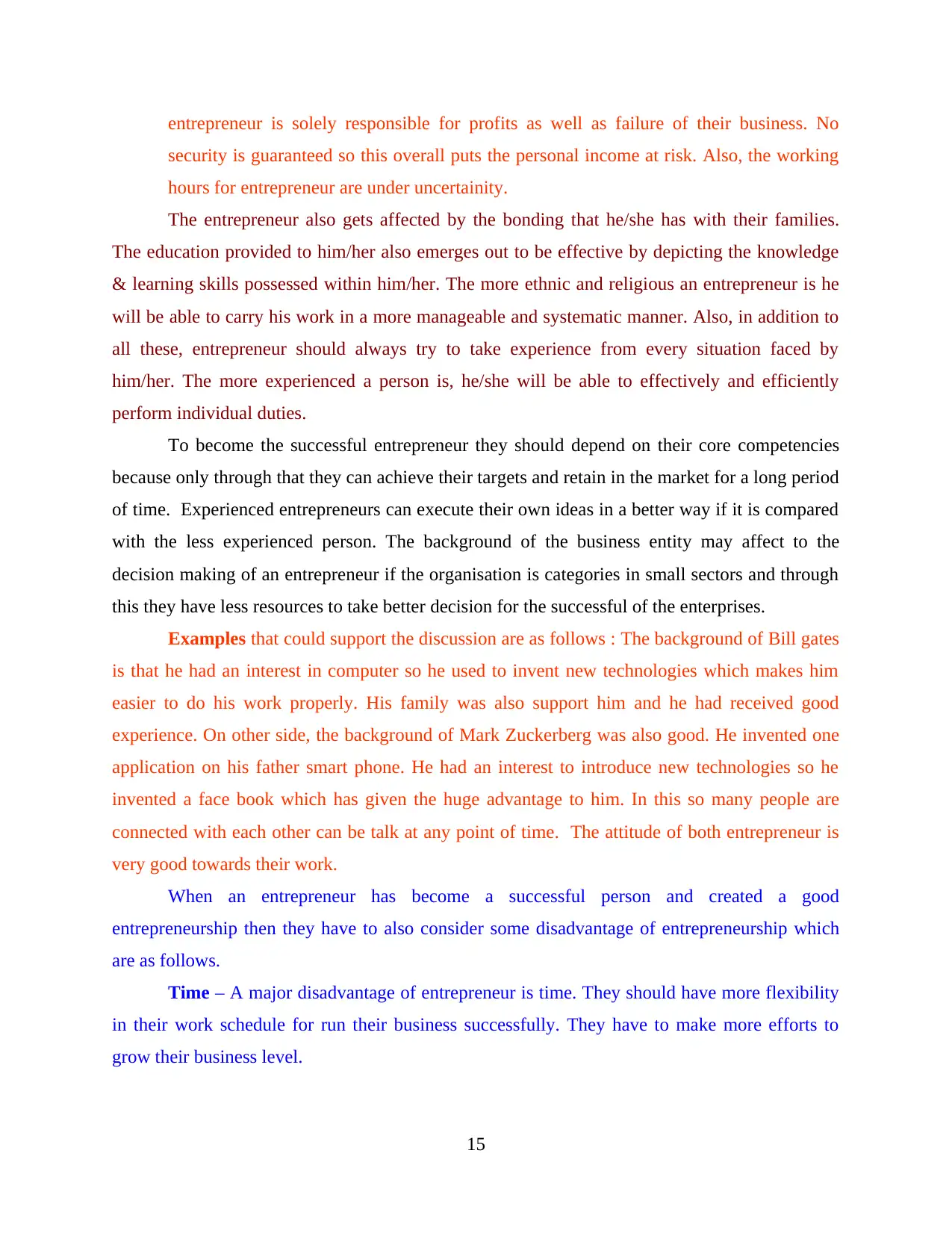
entrepreneur is solely responsible for profits as well as failure of their business. No
security is guaranteed so this overall puts the personal income at risk. Also, the working
hours for entrepreneur are under uncertainity.
The entrepreneur also gets affected by the bonding that he/she has with their families.
The education provided to him/her also emerges out to be effective by depicting the knowledge
& learning skills possessed within him/her. The more ethnic and religious an entrepreneur is he
will be able to carry his work in a more manageable and systematic manner. Also, in addition to
all these, entrepreneur should always try to take experience from every situation faced by
him/her. The more experienced a person is, he/she will be able to effectively and efficiently
perform individual duties.
To become the successful entrepreneur they should depend on their core competencies
because only through that they can achieve their targets and retain in the market for a long period
of time. Experienced entrepreneurs can execute their own ideas in a better way if it is compared
with the less experienced person. The background of the business entity may affect to the
decision making of an entrepreneur if the organisation is categories in small sectors and through
this they have less resources to take better decision for the successful of the enterprises.
Examples that could support the discussion are as follows : The background of Bill gates
is that he had an interest in computer so he used to invent new technologies which makes him
easier to do his work properly. His family was also support him and he had received good
experience. On other side, the background of Mark Zuckerberg was also good. He invented one
application on his father smart phone. He had an interest to introduce new technologies so he
invented a face book which has given the huge advantage to him. In this so many people are
connected with each other can be talk at any point of time. The attitude of both entrepreneur is
very good towards their work.
When an entrepreneur has become a successful person and created a good
entrepreneurship then they have to also consider some disadvantage of entrepreneurship which
are as follows.
Time – A major disadvantage of entrepreneur is time. They should have more flexibility
in their work schedule for run their business successfully. They have to make more efforts to
grow their business level.
15
security is guaranteed so this overall puts the personal income at risk. Also, the working
hours for entrepreneur are under uncertainity.
The entrepreneur also gets affected by the bonding that he/she has with their families.
The education provided to him/her also emerges out to be effective by depicting the knowledge
& learning skills possessed within him/her. The more ethnic and religious an entrepreneur is he
will be able to carry his work in a more manageable and systematic manner. Also, in addition to
all these, entrepreneur should always try to take experience from every situation faced by
him/her. The more experienced a person is, he/she will be able to effectively and efficiently
perform individual duties.
To become the successful entrepreneur they should depend on their core competencies
because only through that they can achieve their targets and retain in the market for a long period
of time. Experienced entrepreneurs can execute their own ideas in a better way if it is compared
with the less experienced person. The background of the business entity may affect to the
decision making of an entrepreneur if the organisation is categories in small sectors and through
this they have less resources to take better decision for the successful of the enterprises.
Examples that could support the discussion are as follows : The background of Bill gates
is that he had an interest in computer so he used to invent new technologies which makes him
easier to do his work properly. His family was also support him and he had received good
experience. On other side, the background of Mark Zuckerberg was also good. He invented one
application on his father smart phone. He had an interest to introduce new technologies so he
invented a face book which has given the huge advantage to him. In this so many people are
connected with each other can be talk at any point of time. The attitude of both entrepreneur is
very good towards their work.
When an entrepreneur has become a successful person and created a good
entrepreneurship then they have to also consider some disadvantage of entrepreneurship which
are as follows.
Time – A major disadvantage of entrepreneur is time. They should have more flexibility
in their work schedule for run their business successfully. They have to make more efforts to
grow their business level.
15
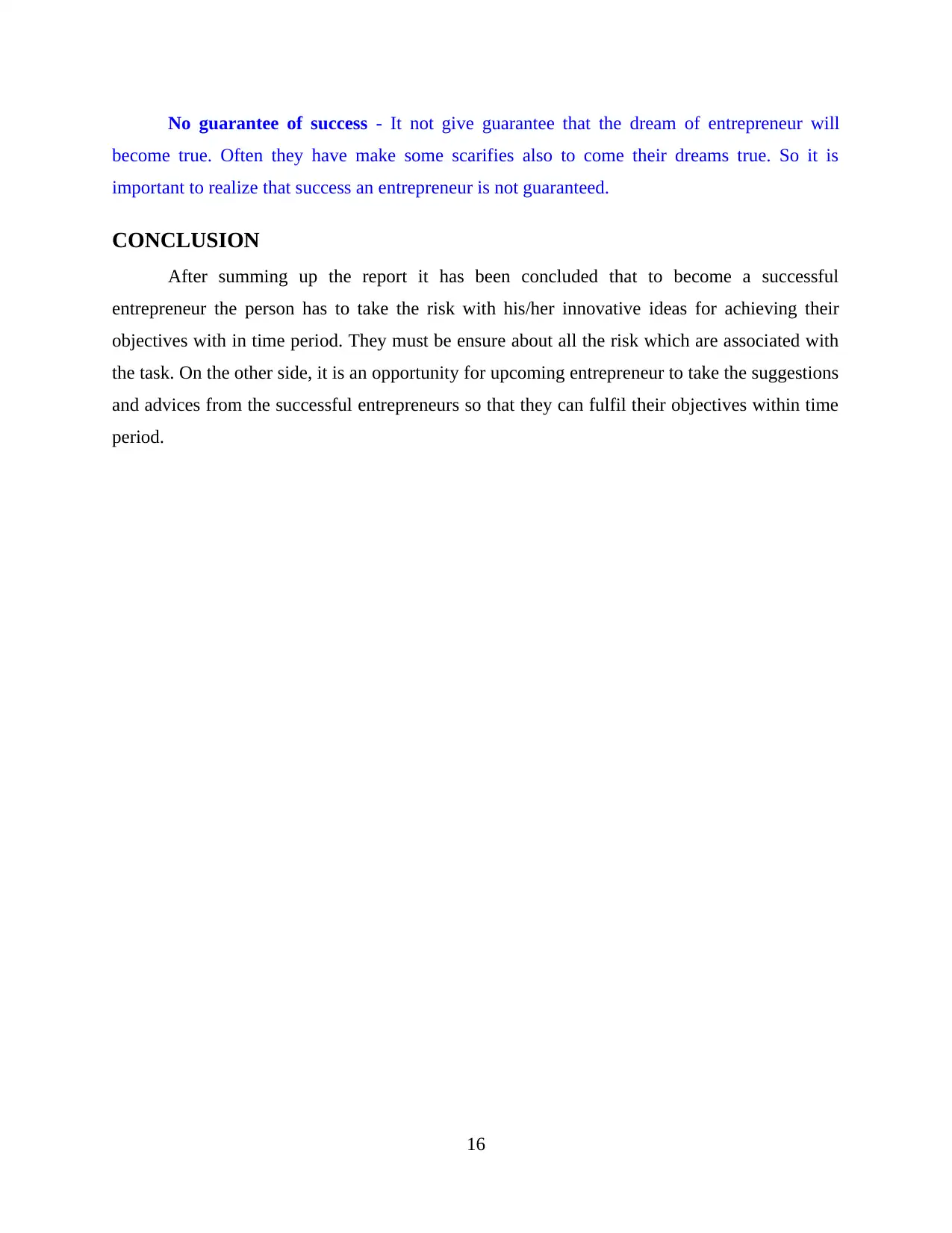
No guarantee of success - It not give guarantee that the dream of entrepreneur will
become true. Often they have make some scarifies also to come their dreams true. So it is
important to realize that success an entrepreneur is not guaranteed.
CONCLUSION
After summing up the report it has been concluded that to become a successful
entrepreneur the person has to take the risk with his/her innovative ideas for achieving their
objectives with in time period. They must be ensure about all the risk which are associated with
the task. On the other side, it is an opportunity for upcoming entrepreneur to take the suggestions
and advices from the successful entrepreneurs so that they can fulfil their objectives within time
period.
16
become true. Often they have make some scarifies also to come their dreams true. So it is
important to realize that success an entrepreneur is not guaranteed.
CONCLUSION
After summing up the report it has been concluded that to become a successful
entrepreneur the person has to take the risk with his/her innovative ideas for achieving their
objectives with in time period. They must be ensure about all the risk which are associated with
the task. On the other side, it is an opportunity for upcoming entrepreneur to take the suggestions
and advices from the successful entrepreneurs so that they can fulfil their objectives within time
period.
16
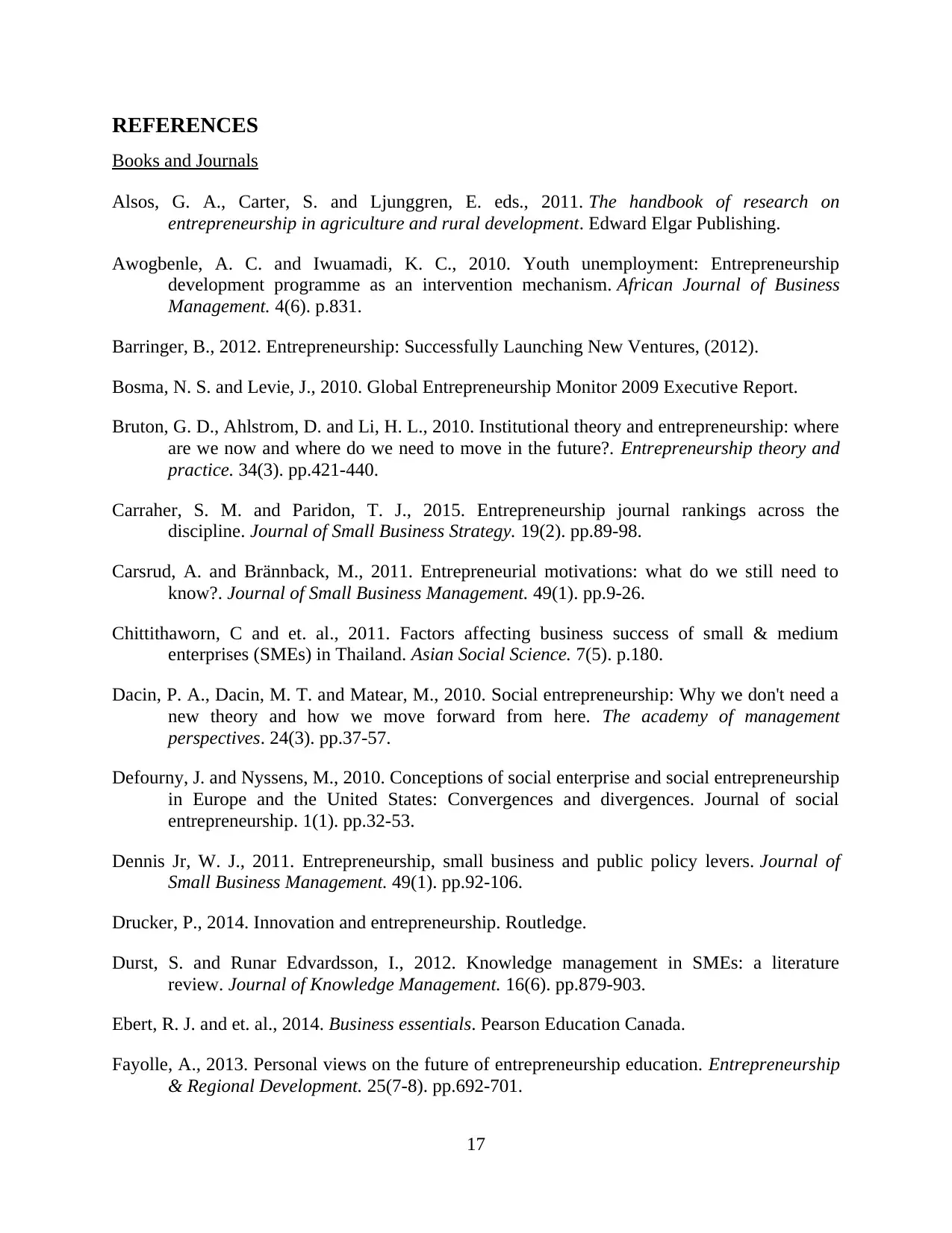
REFERENCES
Books and Journals
Alsos, G. A., Carter, S. and Ljunggren, E. eds., 2011. The handbook of research on
entrepreneurship in agriculture and rural development. Edward Elgar Publishing.
Awogbenle, A. C. and Iwuamadi, K. C., 2010. Youth unemployment: Entrepreneurship
development programme as an intervention mechanism. African Journal of Business
Management. 4(6). p.831.
Barringer, B., 2012. Entrepreneurship: Successfully Launching New Ventures, (2012).
Bosma, N. S. and Levie, J., 2010. Global Entrepreneurship Monitor 2009 Executive Report.
Bruton, G. D., Ahlstrom, D. and Li, H. L., 2010. Institutional theory and entrepreneurship: where
are we now and where do we need to move in the future?. Entrepreneurship theory and
practice. 34(3). pp.421-440.
Carraher, S. M. and Paridon, T. J., 2015. Entrepreneurship journal rankings across the
discipline. Journal of Small Business Strategy. 19(2). pp.89-98.
Carsrud, A. and Brännback, M., 2011. Entrepreneurial motivations: what do we still need to
know?. Journal of Small Business Management. 49(1). pp.9-26.
Chittithaworn, C and et. al., 2011. Factors affecting business success of small & medium
enterprises (SMEs) in Thailand. Asian Social Science. 7(5). p.180.
Dacin, P. A., Dacin, M. T. and Matear, M., 2010. Social entrepreneurship: Why we don't need a
new theory and how we move forward from here. The academy of management
perspectives. 24(3). pp.37-57.
Defourny, J. and Nyssens, M., 2010. Conceptions of social enterprise and social entrepreneurship
in Europe and the United States: Convergences and divergences. Journal of social
entrepreneurship. 1(1). pp.32-53.
Dennis Jr, W. J., 2011. Entrepreneurship, small business and public policy levers. Journal of
Small Business Management. 49(1). pp.92-106.
Drucker, P., 2014. Innovation and entrepreneurship. Routledge.
Durst, S. and Runar Edvardsson, I., 2012. Knowledge management in SMEs: a literature
review. Journal of Knowledge Management. 16(6). pp.879-903.
Ebert, R. J. and et. al., 2014. Business essentials. Pearson Education Canada.
Fayolle, A., 2013. Personal views on the future of entrepreneurship education. Entrepreneurship
& Regional Development. 25(7-8). pp.692-701.
17
Books and Journals
Alsos, G. A., Carter, S. and Ljunggren, E. eds., 2011. The handbook of research on
entrepreneurship in agriculture and rural development. Edward Elgar Publishing.
Awogbenle, A. C. and Iwuamadi, K. C., 2010. Youth unemployment: Entrepreneurship
development programme as an intervention mechanism. African Journal of Business
Management. 4(6). p.831.
Barringer, B., 2012. Entrepreneurship: Successfully Launching New Ventures, (2012).
Bosma, N. S. and Levie, J., 2010. Global Entrepreneurship Monitor 2009 Executive Report.
Bruton, G. D., Ahlstrom, D. and Li, H. L., 2010. Institutional theory and entrepreneurship: where
are we now and where do we need to move in the future?. Entrepreneurship theory and
practice. 34(3). pp.421-440.
Carraher, S. M. and Paridon, T. J., 2015. Entrepreneurship journal rankings across the
discipline. Journal of Small Business Strategy. 19(2). pp.89-98.
Carsrud, A. and Brännback, M., 2011. Entrepreneurial motivations: what do we still need to
know?. Journal of Small Business Management. 49(1). pp.9-26.
Chittithaworn, C and et. al., 2011. Factors affecting business success of small & medium
enterprises (SMEs) in Thailand. Asian Social Science. 7(5). p.180.
Dacin, P. A., Dacin, M. T. and Matear, M., 2010. Social entrepreneurship: Why we don't need a
new theory and how we move forward from here. The academy of management
perspectives. 24(3). pp.37-57.
Defourny, J. and Nyssens, M., 2010. Conceptions of social enterprise and social entrepreneurship
in Europe and the United States: Convergences and divergences. Journal of social
entrepreneurship. 1(1). pp.32-53.
Dennis Jr, W. J., 2011. Entrepreneurship, small business and public policy levers. Journal of
Small Business Management. 49(1). pp.92-106.
Drucker, P., 2014. Innovation and entrepreneurship. Routledge.
Durst, S. and Runar Edvardsson, I., 2012. Knowledge management in SMEs: a literature
review. Journal of Knowledge Management. 16(6). pp.879-903.
Ebert, R. J. and et. al., 2014. Business essentials. Pearson Education Canada.
Fayolle, A., 2013. Personal views on the future of entrepreneurship education. Entrepreneurship
& Regional Development. 25(7-8). pp.692-701.
17
Paraphrase This Document
Need a fresh take? Get an instant paraphrase of this document with our AI Paraphraser
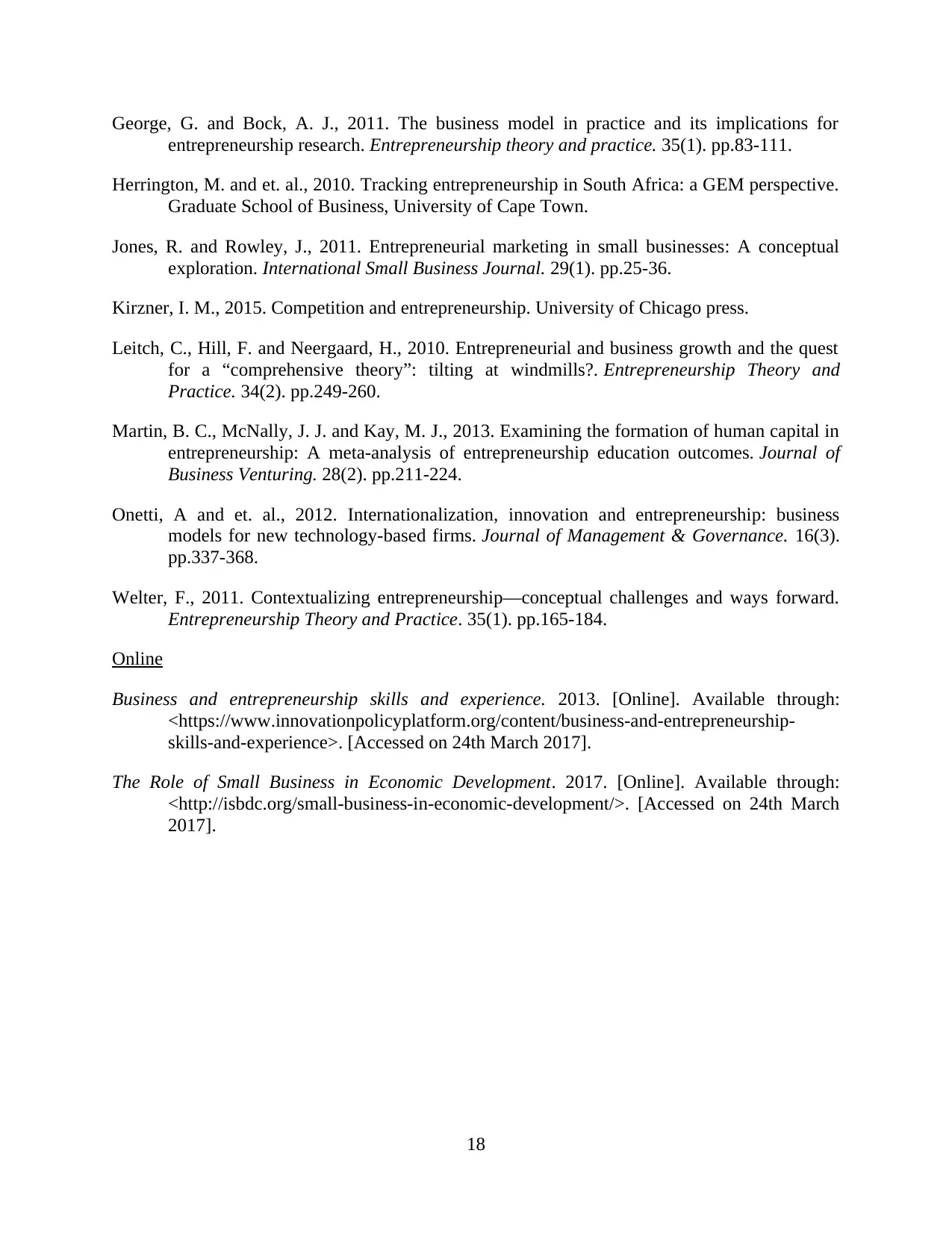
George, G. and Bock, A. J., 2011. The business model in practice and its implications for
entrepreneurship research. Entrepreneurship theory and practice. 35(1). pp.83-111.
Herrington, M. and et. al., 2010. Tracking entrepreneurship in South Africa: a GEM perspective.
Graduate School of Business, University of Cape Town.
Jones, R. and Rowley, J., 2011. Entrepreneurial marketing in small businesses: A conceptual
exploration. International Small Business Journal. 29(1). pp.25-36.
Kirzner, I. M., 2015. Competition and entrepreneurship. University of Chicago press.
Leitch, C., Hill, F. and Neergaard, H., 2010. Entrepreneurial and business growth and the quest
for a “comprehensive theory”: tilting at windmills?. Entrepreneurship Theory and
Practice. 34(2). pp.249-260.
Martin, B. C., McNally, J. J. and Kay, M. J., 2013. Examining the formation of human capital in
entrepreneurship: A meta-analysis of entrepreneurship education outcomes. Journal of
Business Venturing. 28(2). pp.211-224.
Onetti, A and et. al., 2012. Internationalization, innovation and entrepreneurship: business
models for new technology-based firms. Journal of Management & Governance. 16(3).
pp.337-368.
Welter, F., 2011. Contextualizing entrepreneurship—conceptual challenges and ways forward.
Entrepreneurship Theory and Practice. 35(1). pp.165-184.
Online
Business and entrepreneurship skills and experience. 2013. [Online]. Available through:
<https://www.innovationpolicyplatform.org/content/business-and-entrepreneurship-
skills-and-experience>. [Accessed on 24th March 2017].
The Role of Small Business in Economic Development. 2017. [Online]. Available through:
<http://isbdc.org/small-business-in-economic-development/>. [Accessed on 24th March
2017].
18
entrepreneurship research. Entrepreneurship theory and practice. 35(1). pp.83-111.
Herrington, M. and et. al., 2010. Tracking entrepreneurship in South Africa: a GEM perspective.
Graduate School of Business, University of Cape Town.
Jones, R. and Rowley, J., 2011. Entrepreneurial marketing in small businesses: A conceptual
exploration. International Small Business Journal. 29(1). pp.25-36.
Kirzner, I. M., 2015. Competition and entrepreneurship. University of Chicago press.
Leitch, C., Hill, F. and Neergaard, H., 2010. Entrepreneurial and business growth and the quest
for a “comprehensive theory”: tilting at windmills?. Entrepreneurship Theory and
Practice. 34(2). pp.249-260.
Martin, B. C., McNally, J. J. and Kay, M. J., 2013. Examining the formation of human capital in
entrepreneurship: A meta-analysis of entrepreneurship education outcomes. Journal of
Business Venturing. 28(2). pp.211-224.
Onetti, A and et. al., 2012. Internationalization, innovation and entrepreneurship: business
models for new technology-based firms. Journal of Management & Governance. 16(3).
pp.337-368.
Welter, F., 2011. Contextualizing entrepreneurship—conceptual challenges and ways forward.
Entrepreneurship Theory and Practice. 35(1). pp.165-184.
Online
Business and entrepreneurship skills and experience. 2013. [Online]. Available through:
<https://www.innovationpolicyplatform.org/content/business-and-entrepreneurship-
skills-and-experience>. [Accessed on 24th March 2017].
The Role of Small Business in Economic Development. 2017. [Online]. Available through:
<http://isbdc.org/small-business-in-economic-development/>. [Accessed on 24th March
2017].
18
1 out of 20
Related Documents
Your All-in-One AI-Powered Toolkit for Academic Success.
+13062052269
info@desklib.com
Available 24*7 on WhatsApp / Email
![[object Object]](/_next/static/media/star-bottom.7253800d.svg)
Unlock your academic potential
© 2024 | Zucol Services PVT LTD | All rights reserved.





